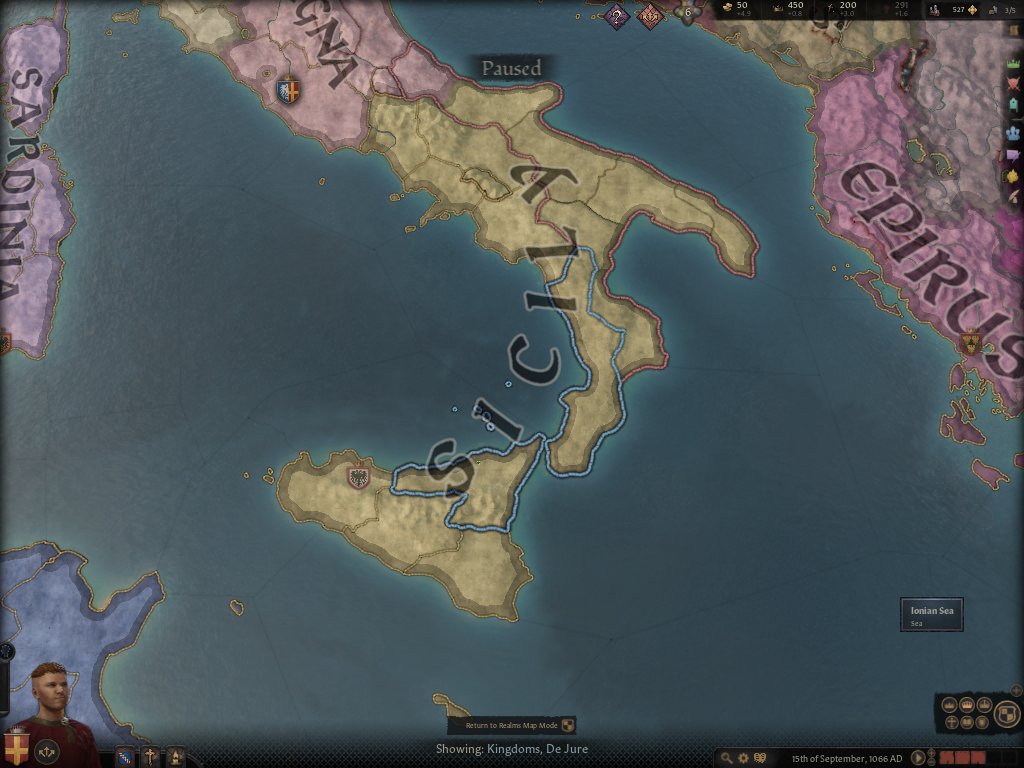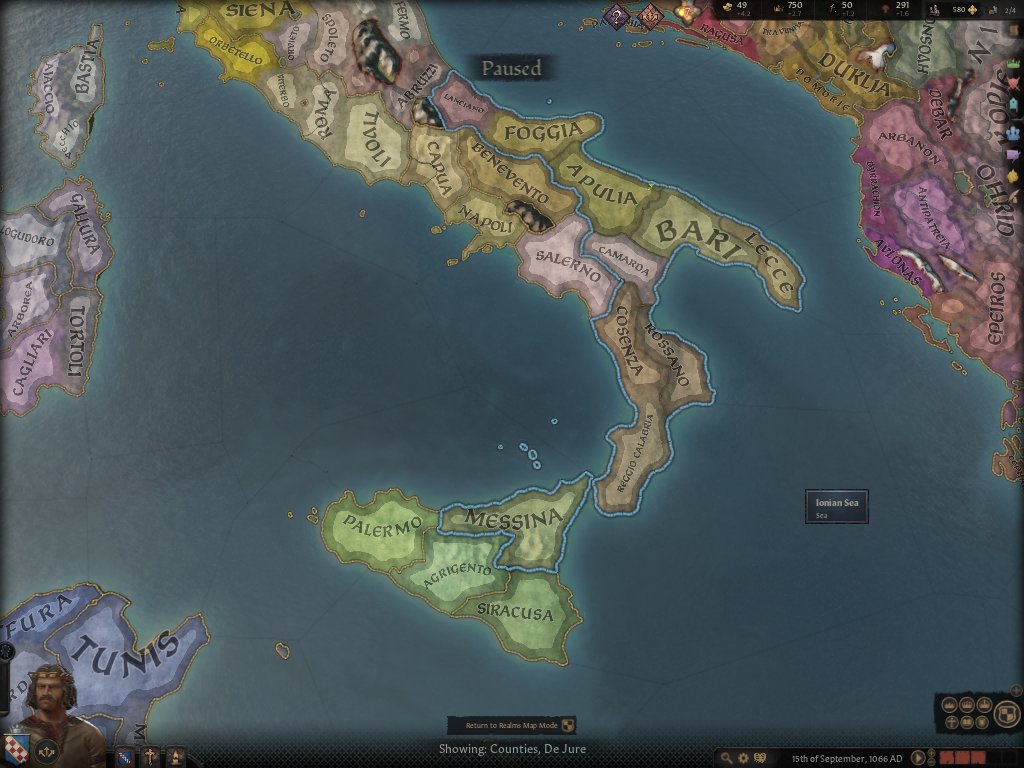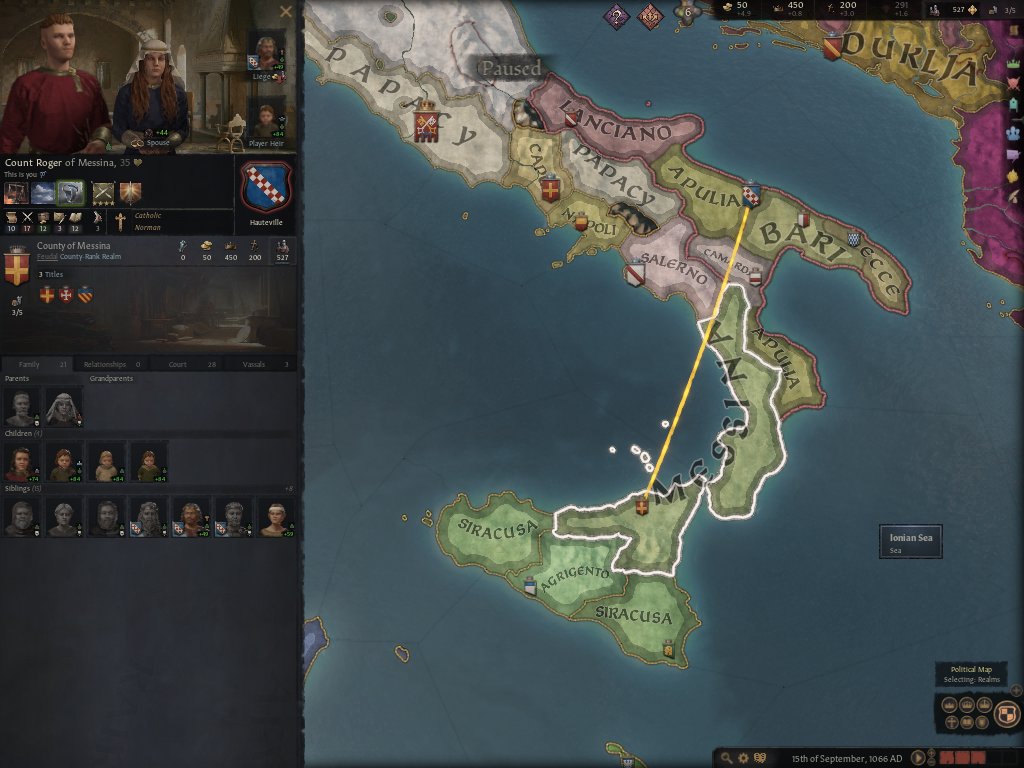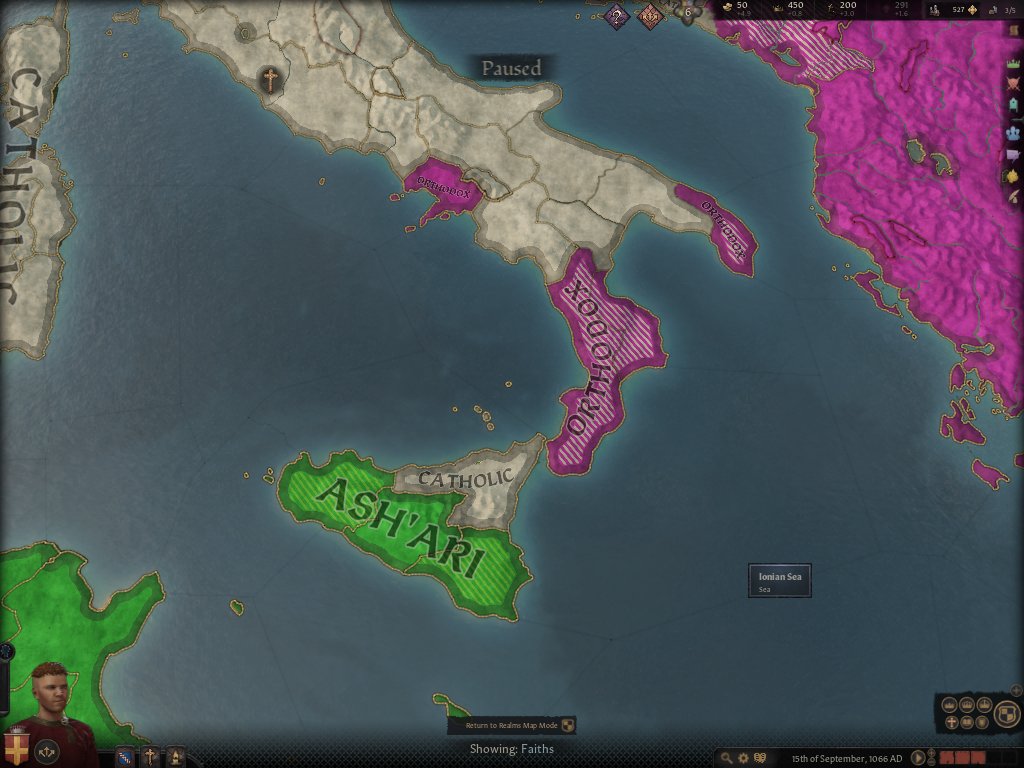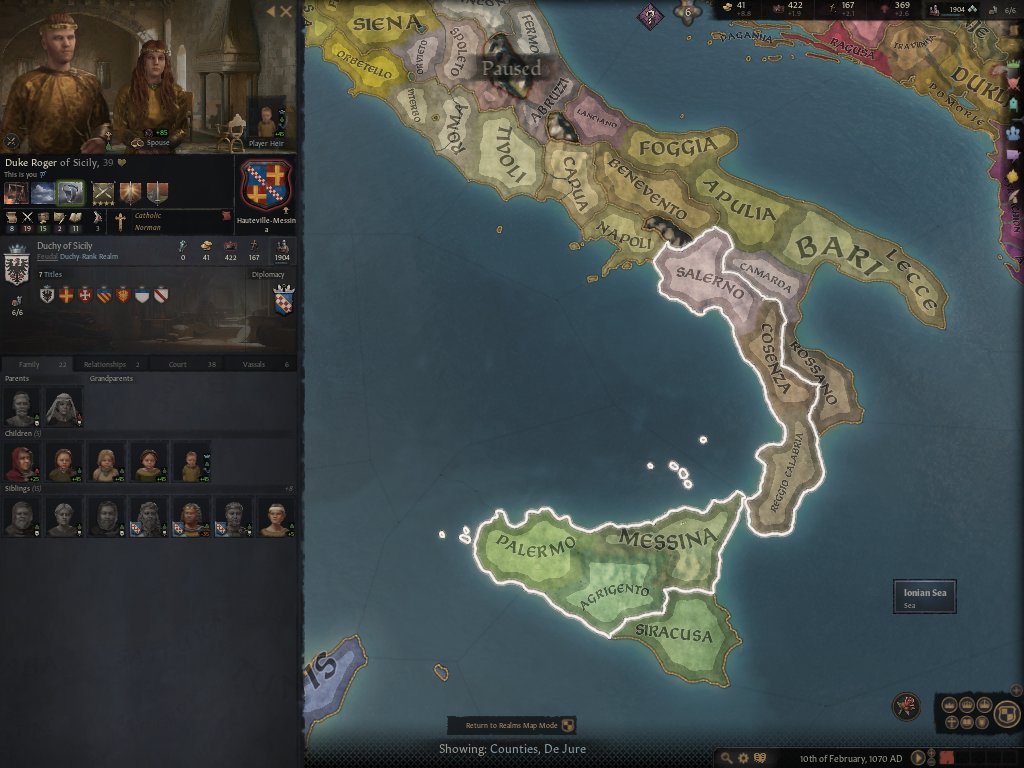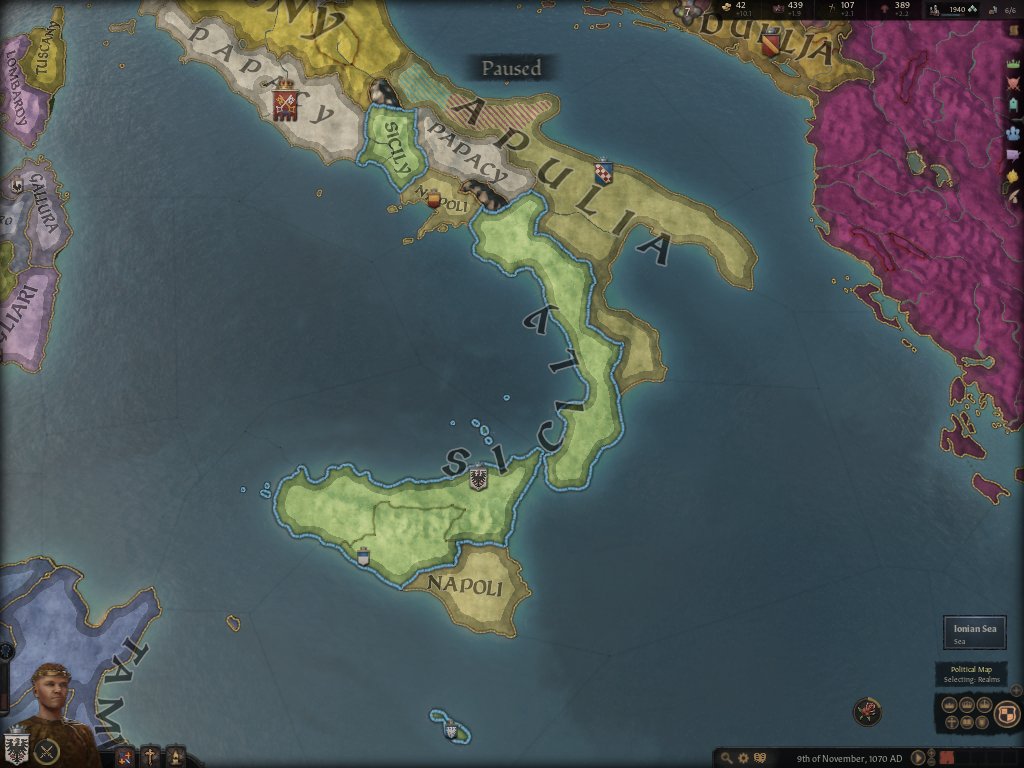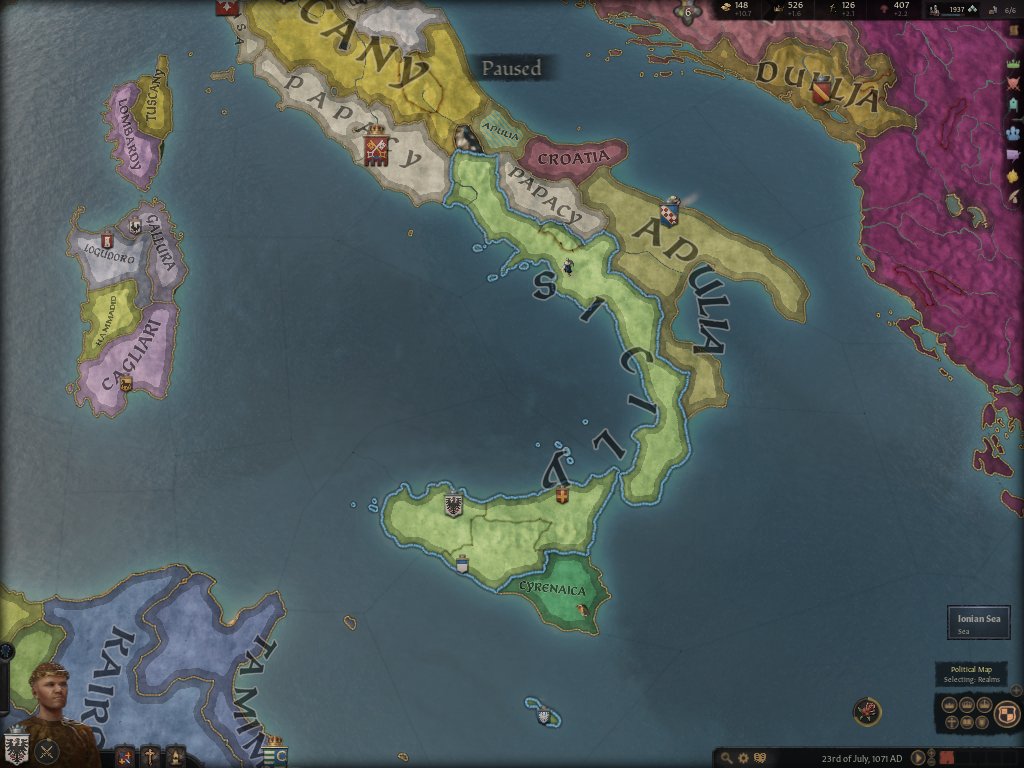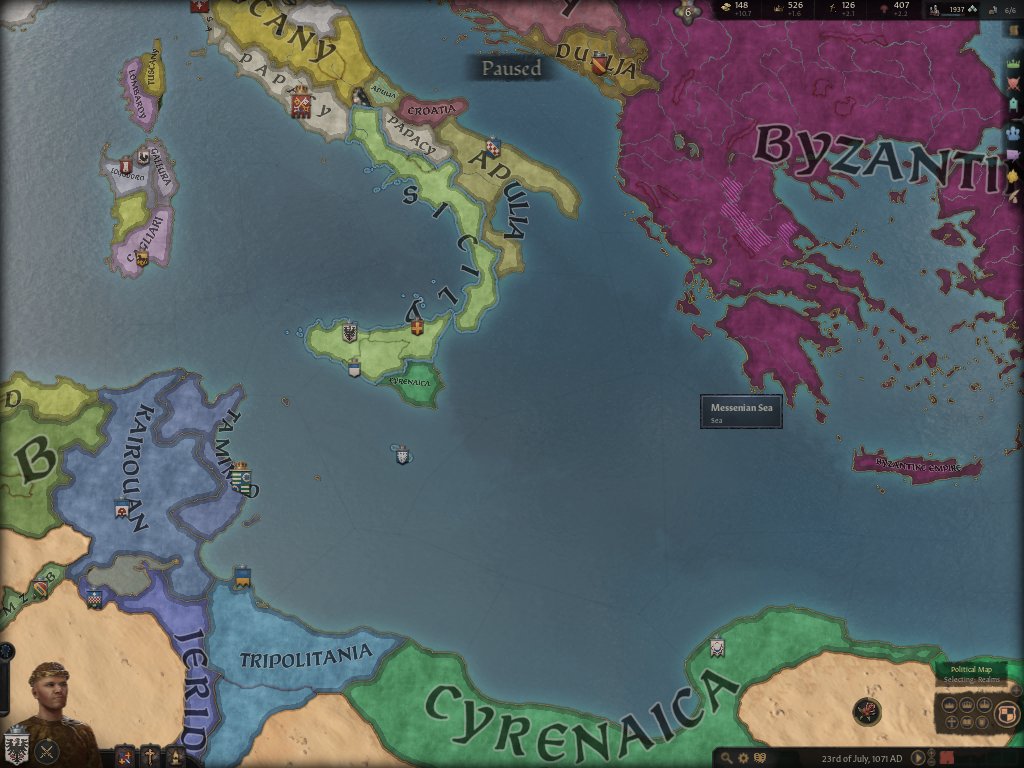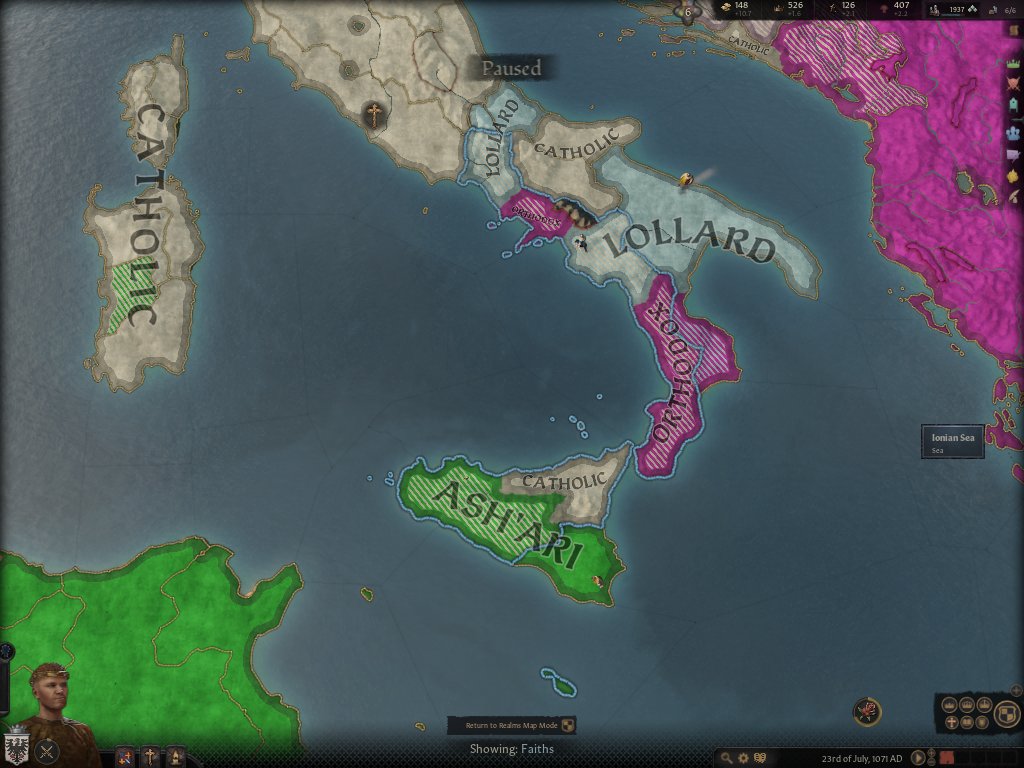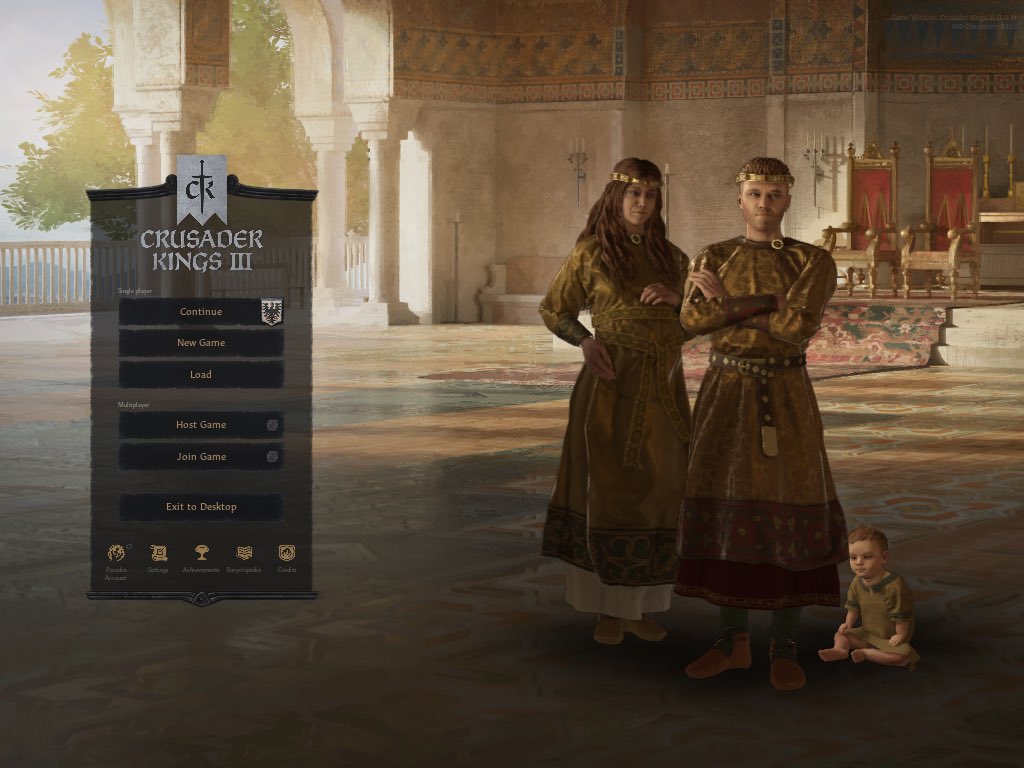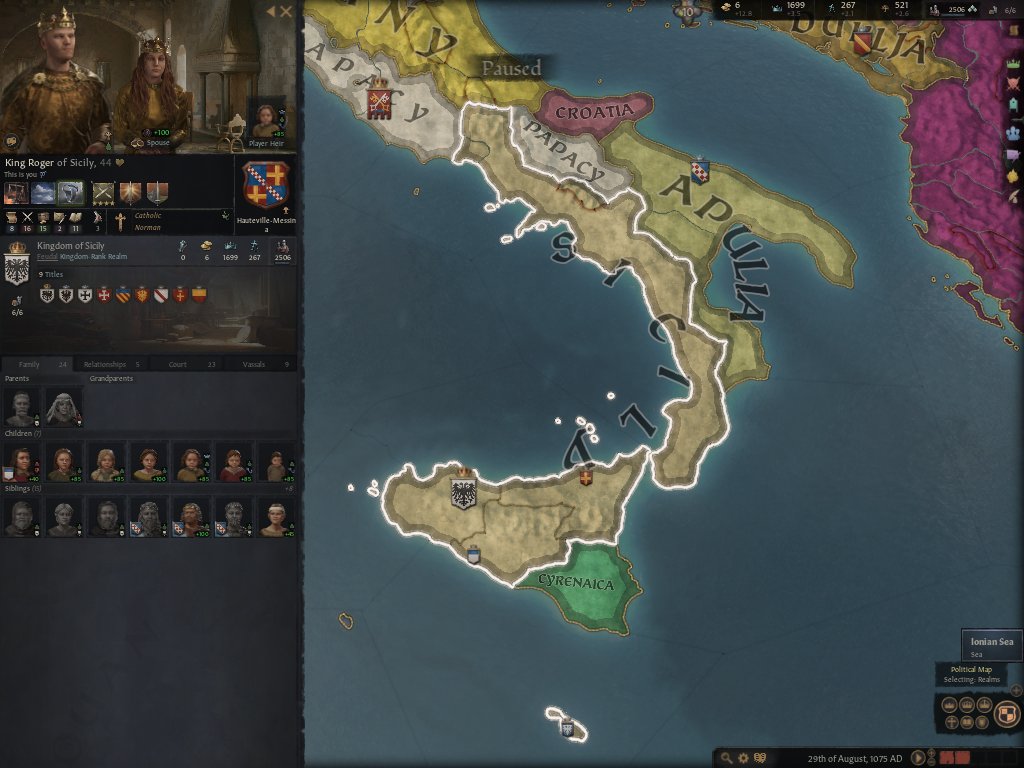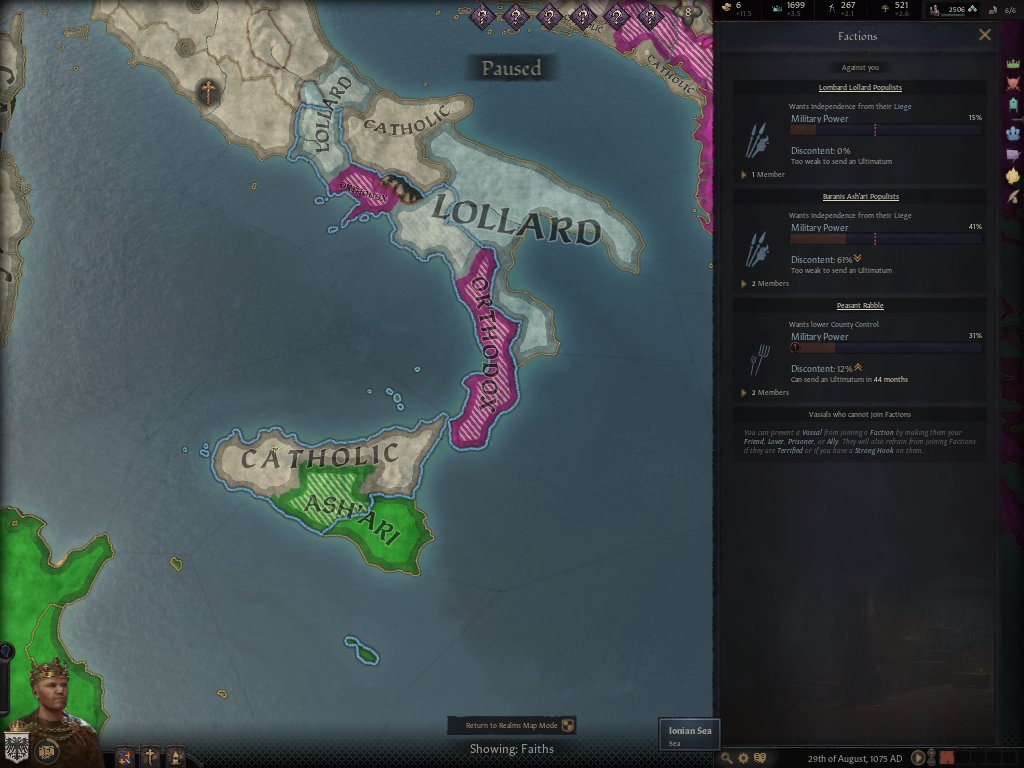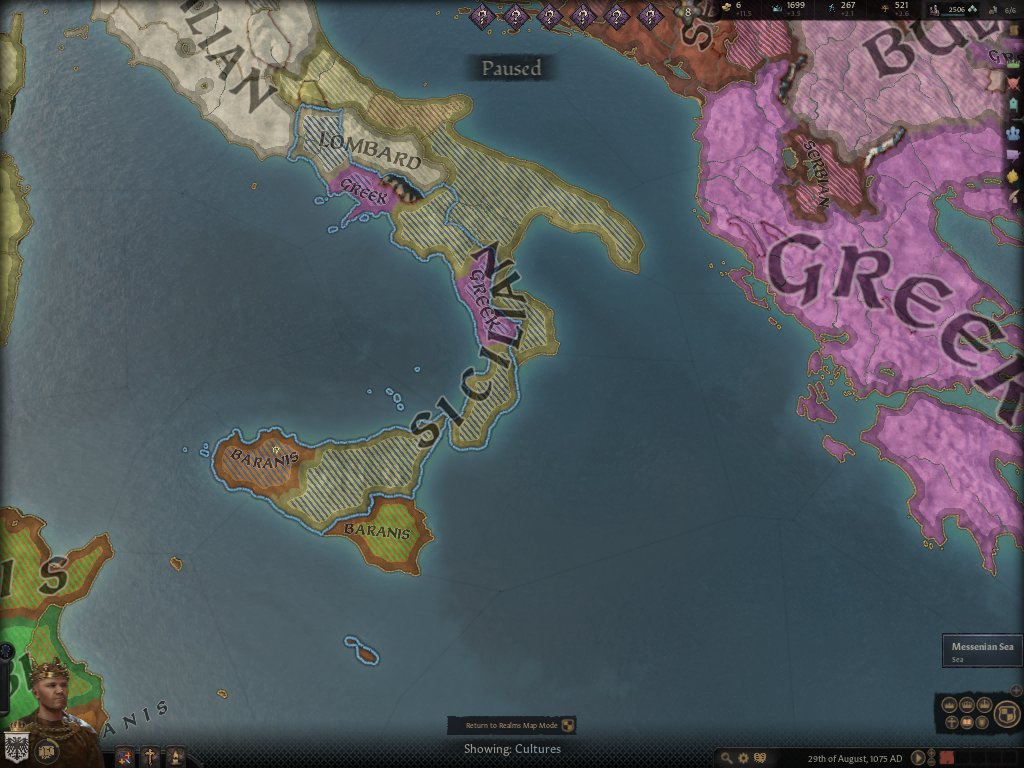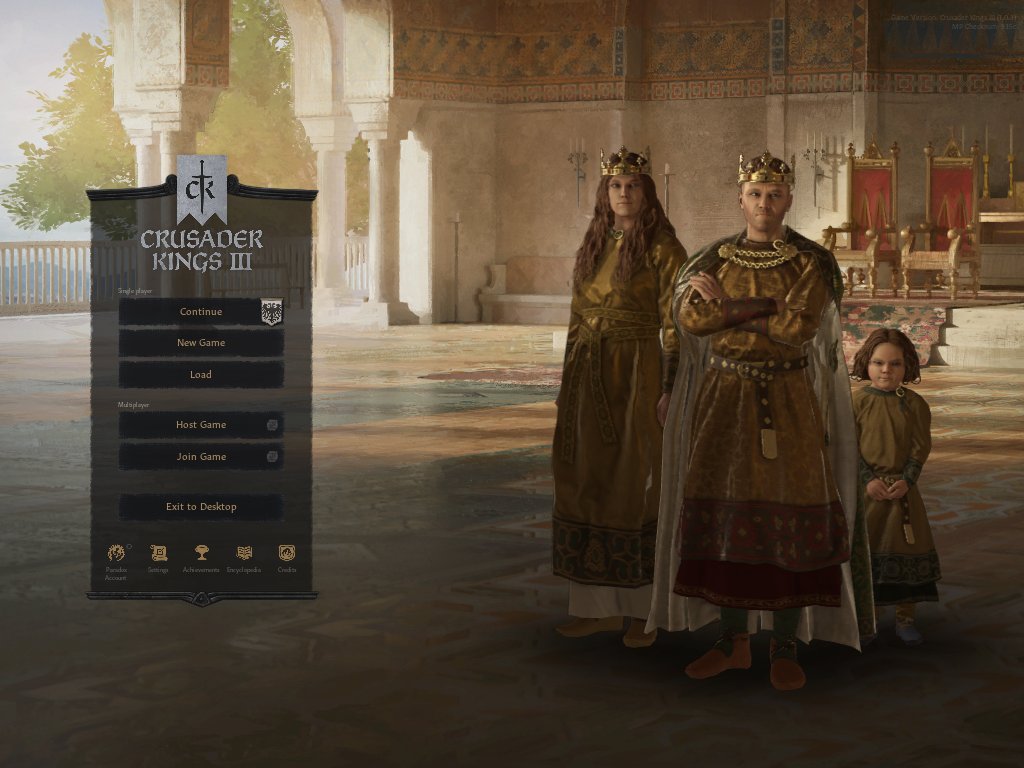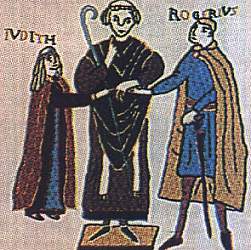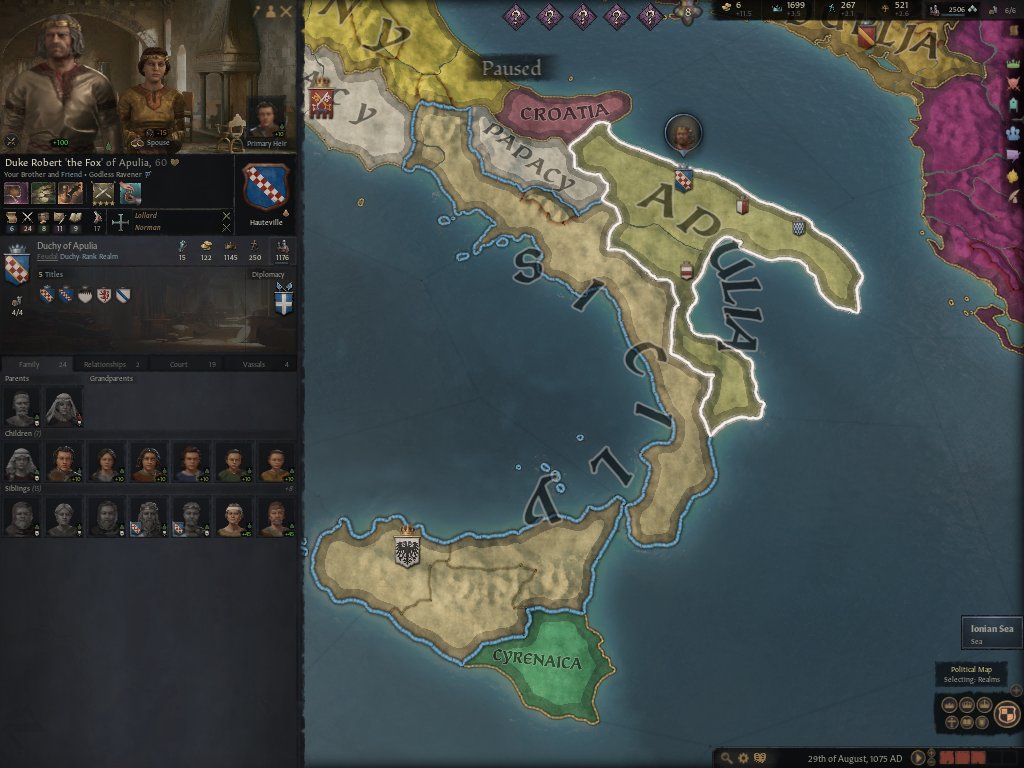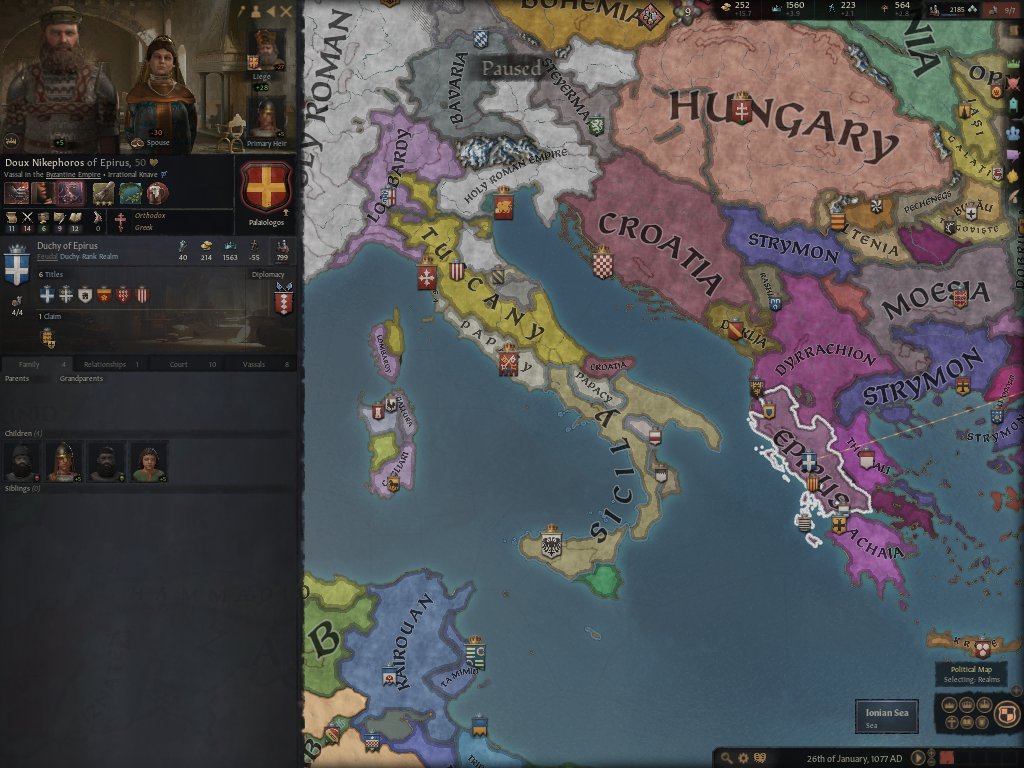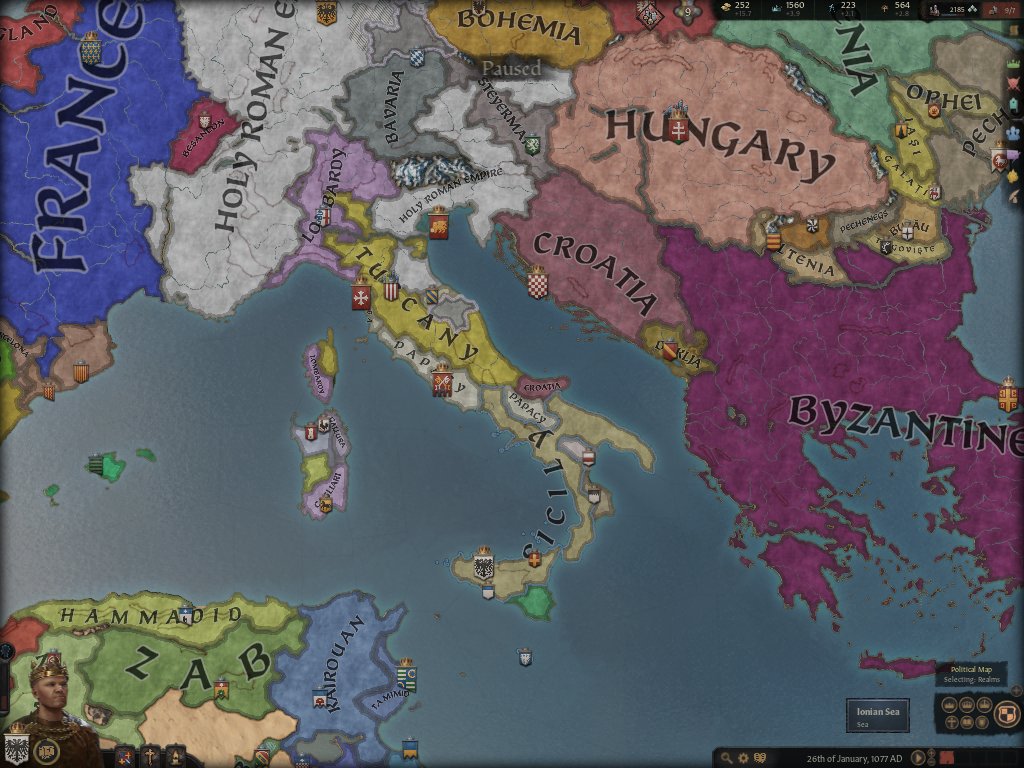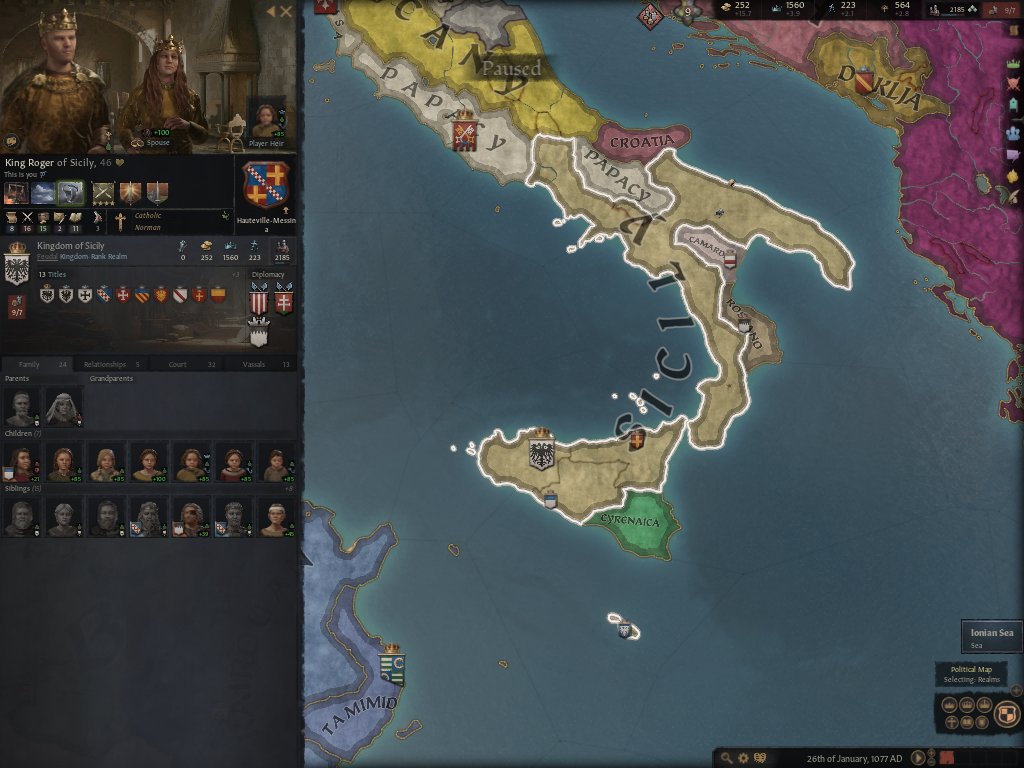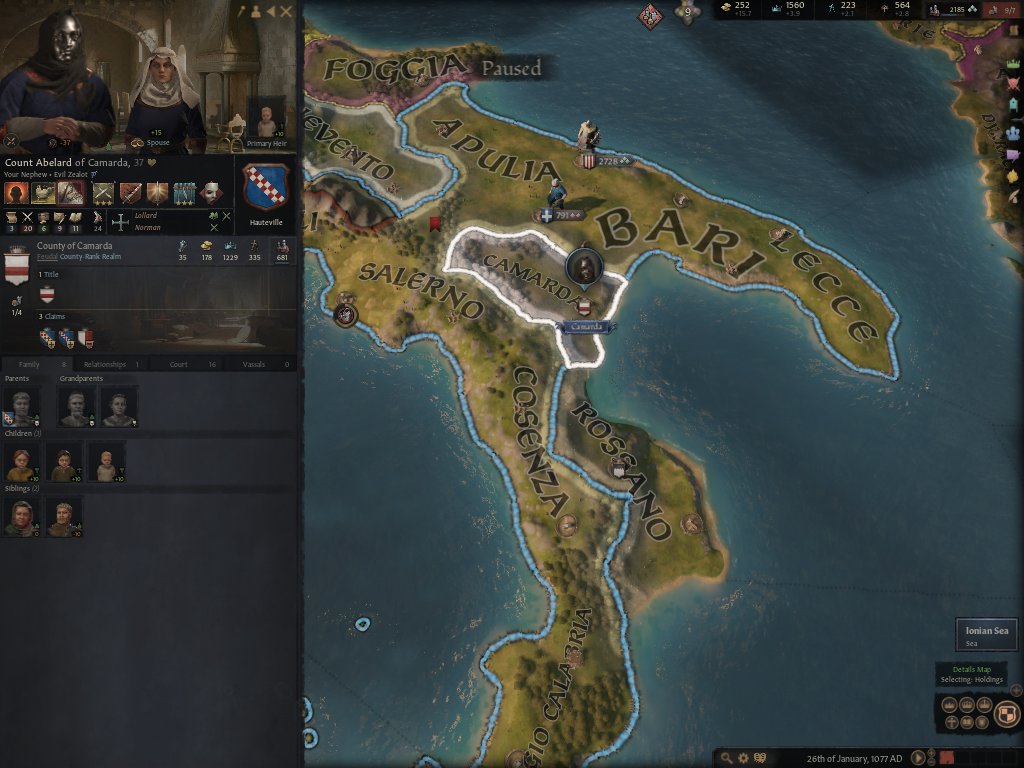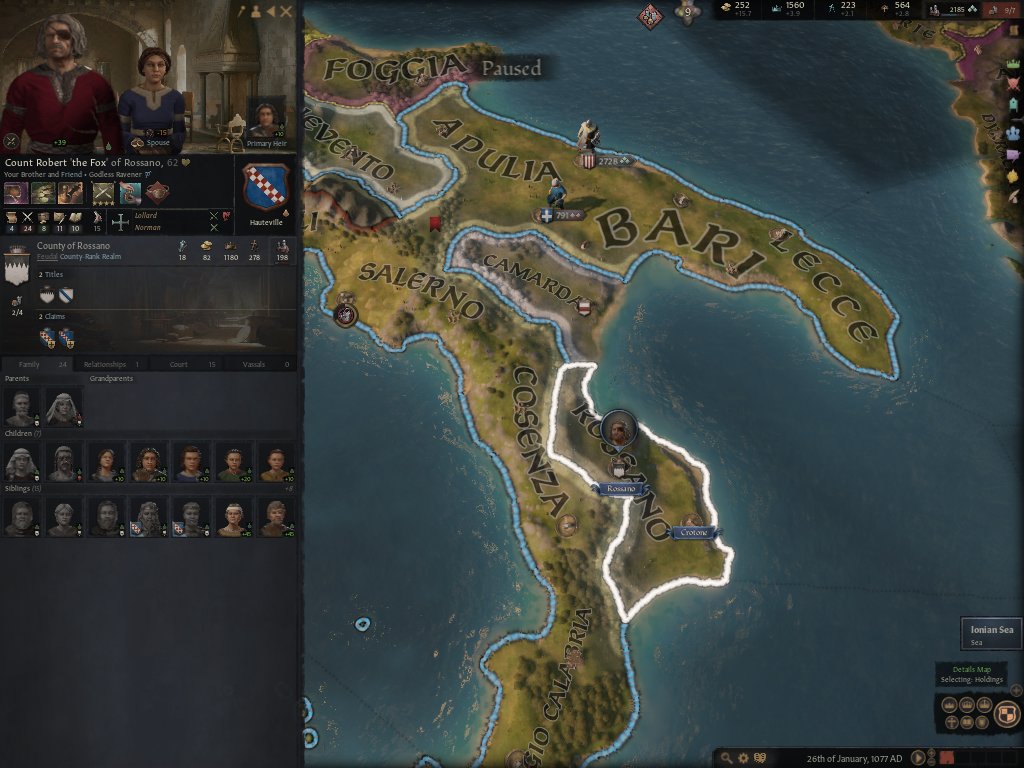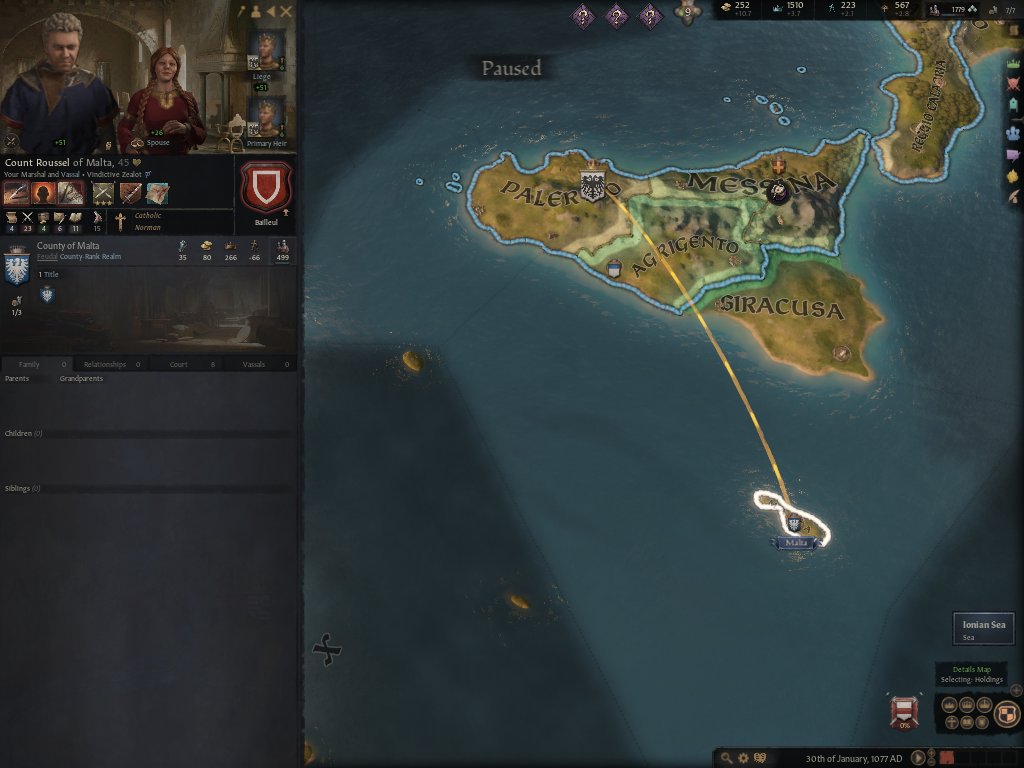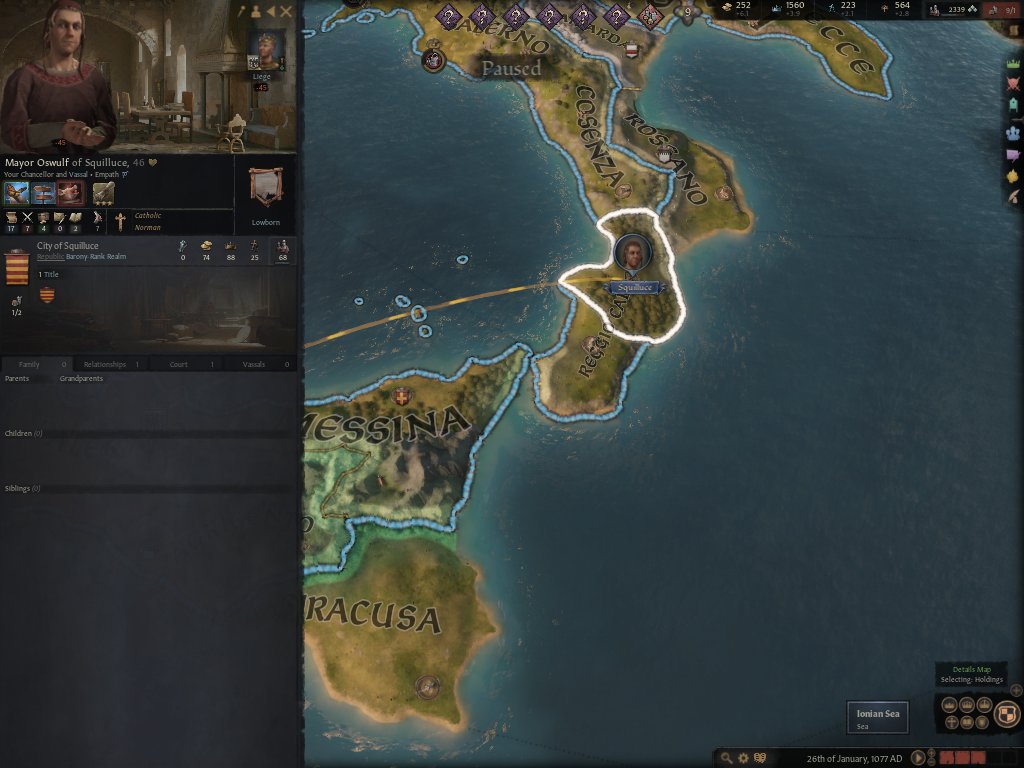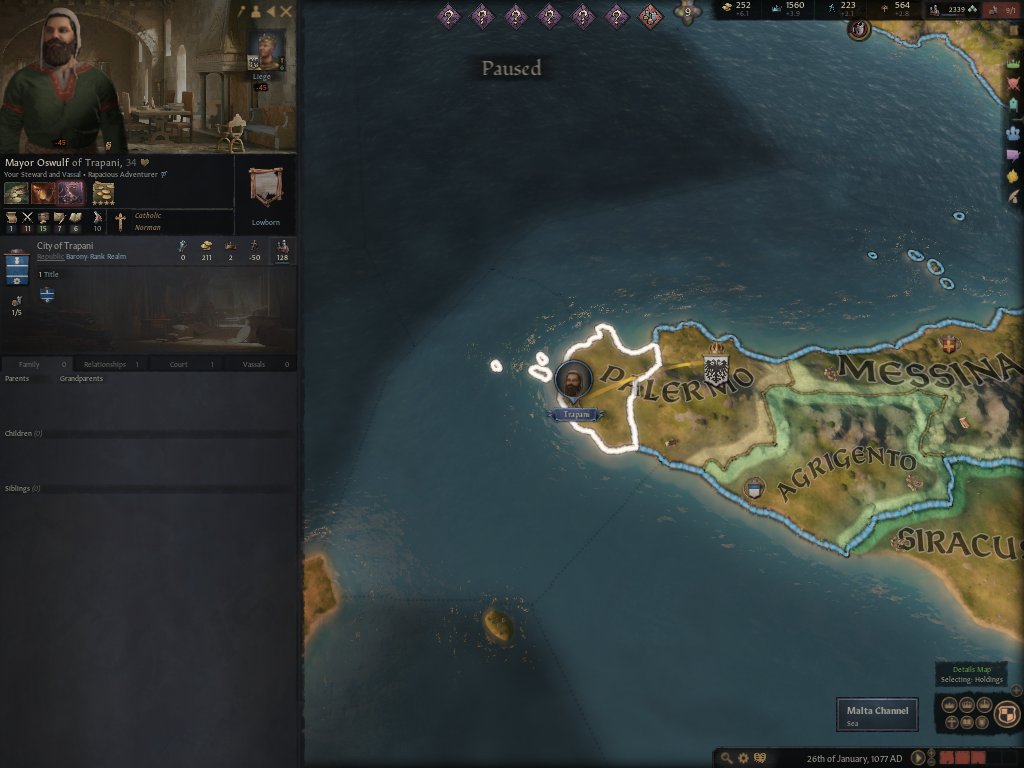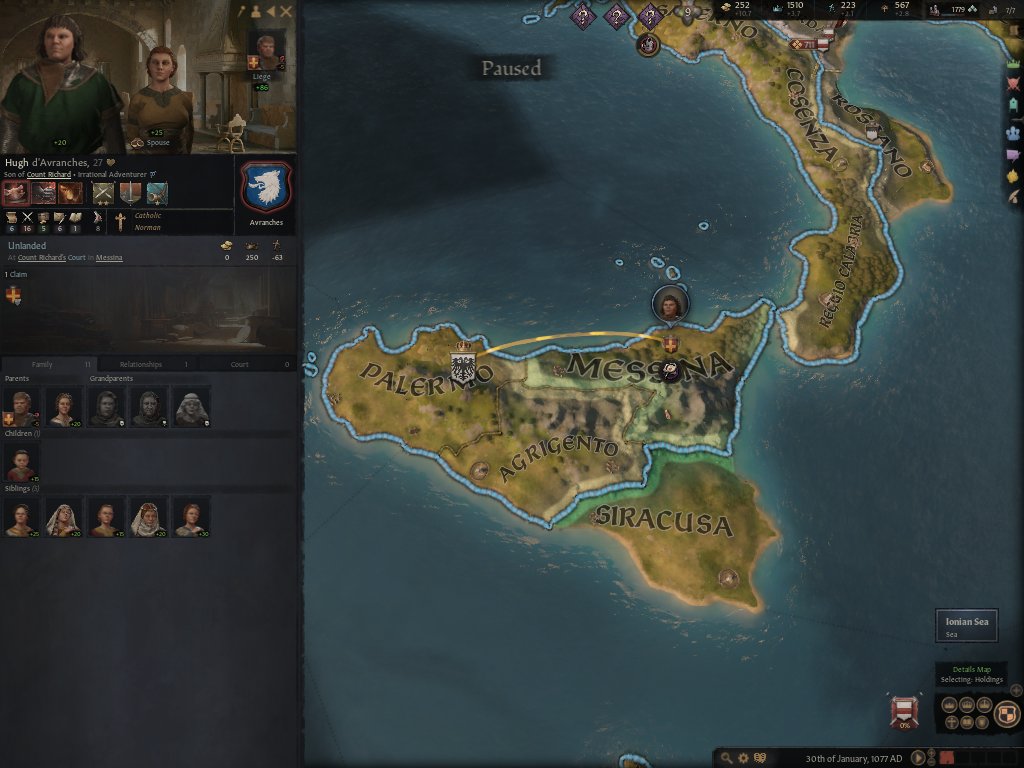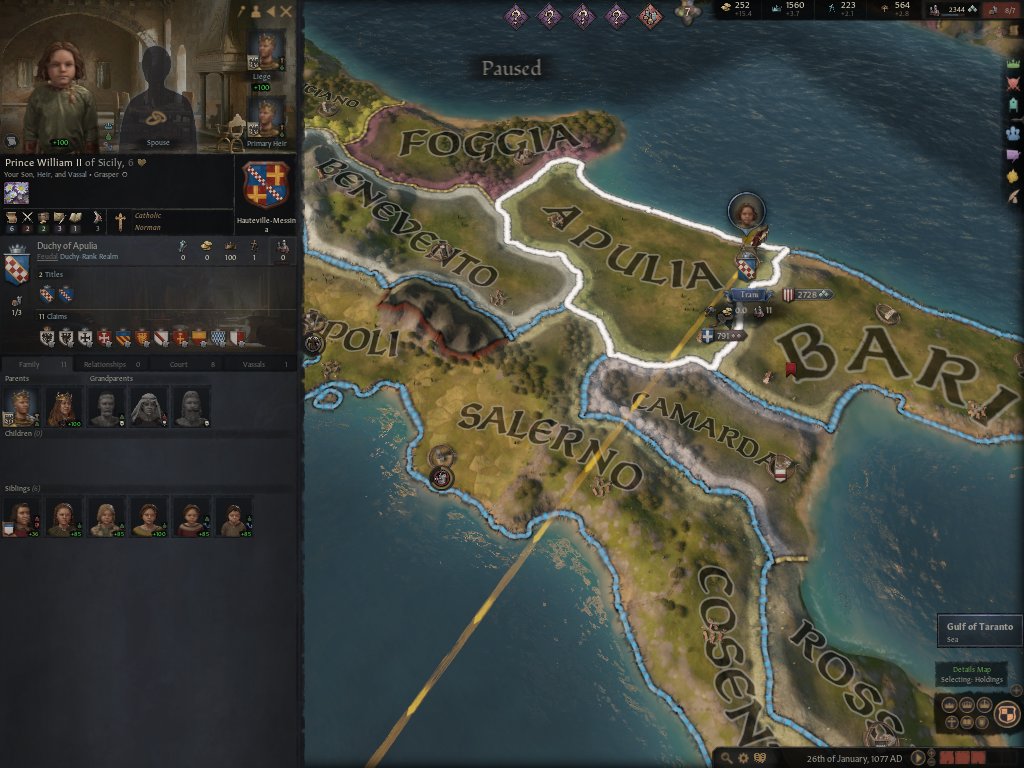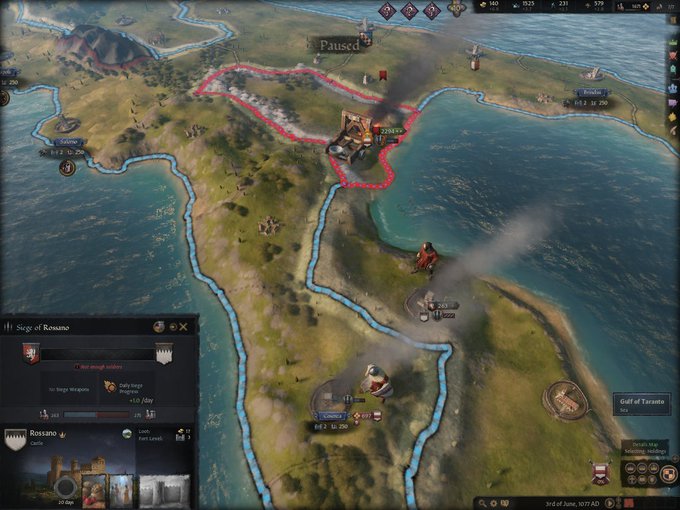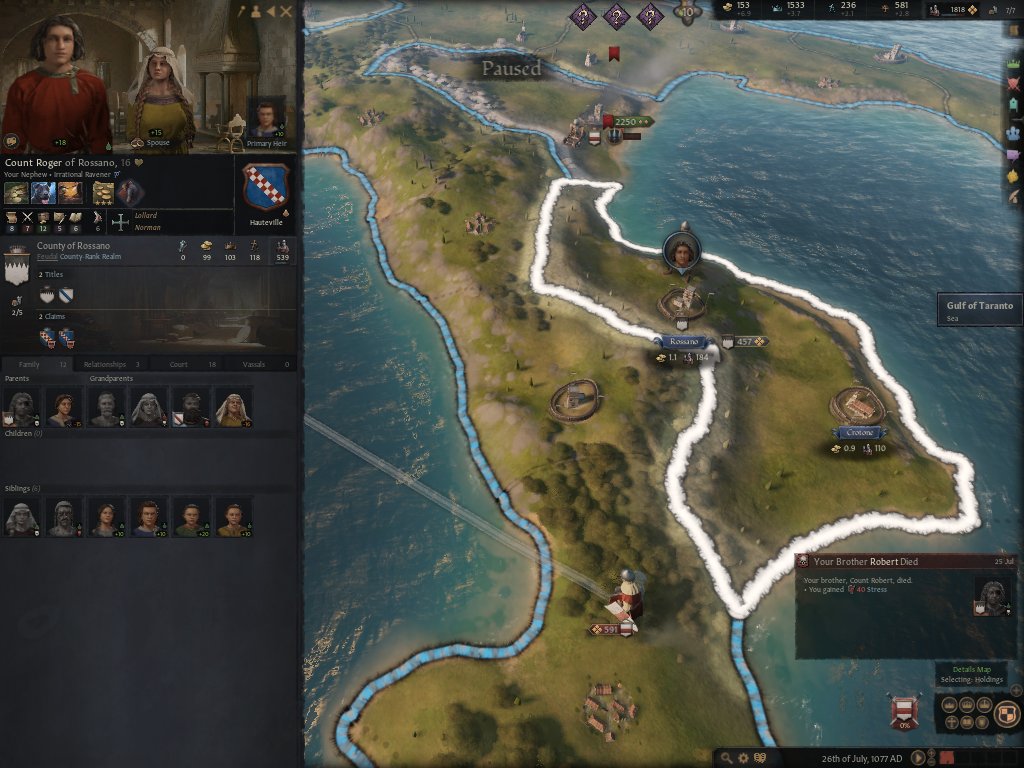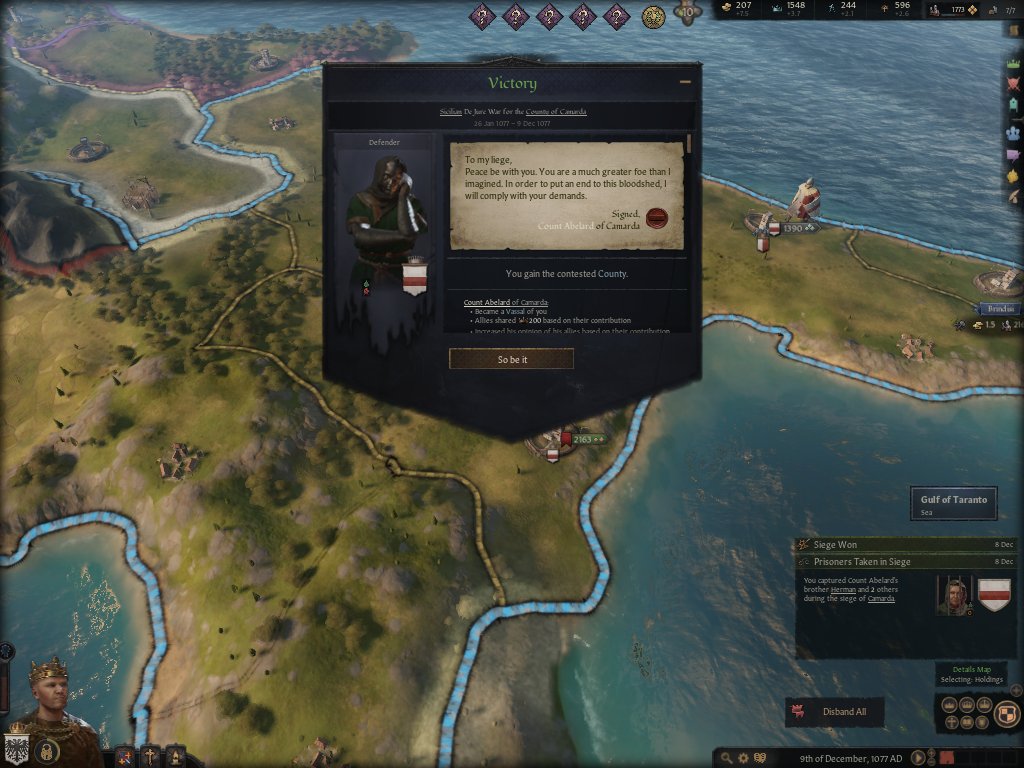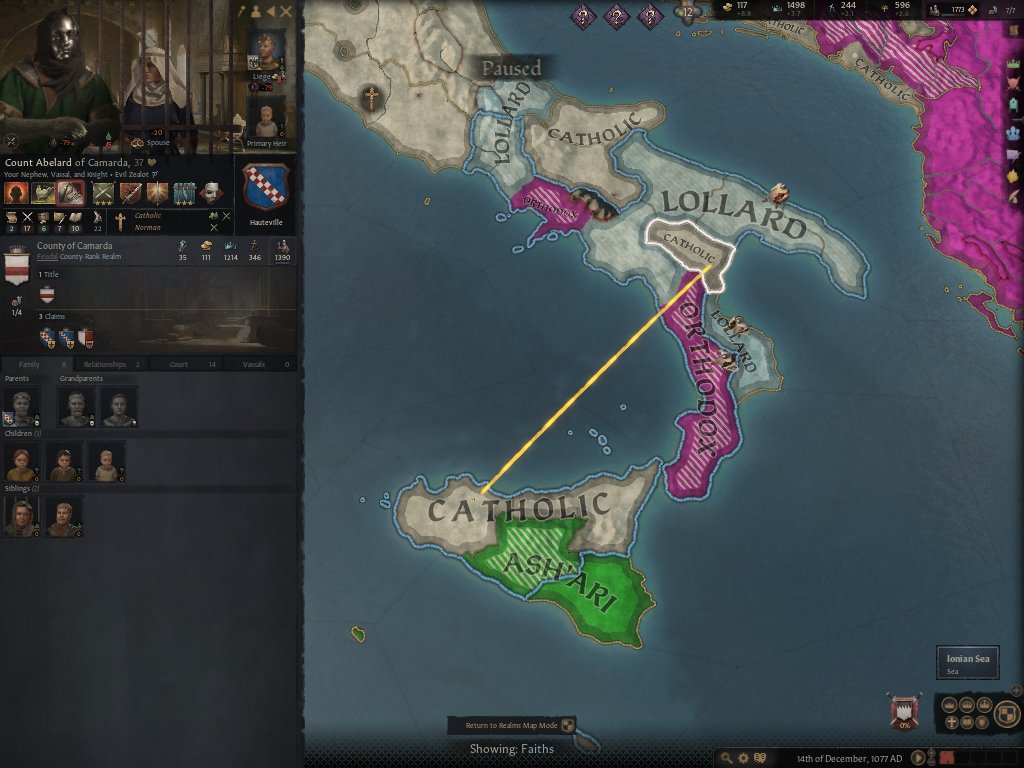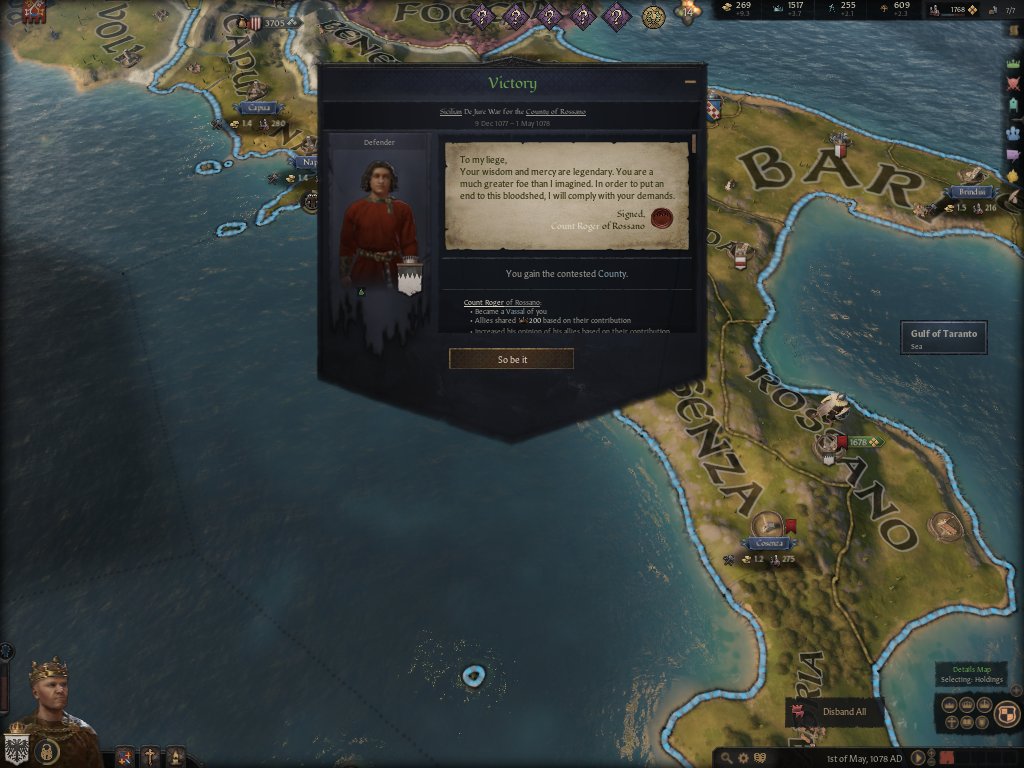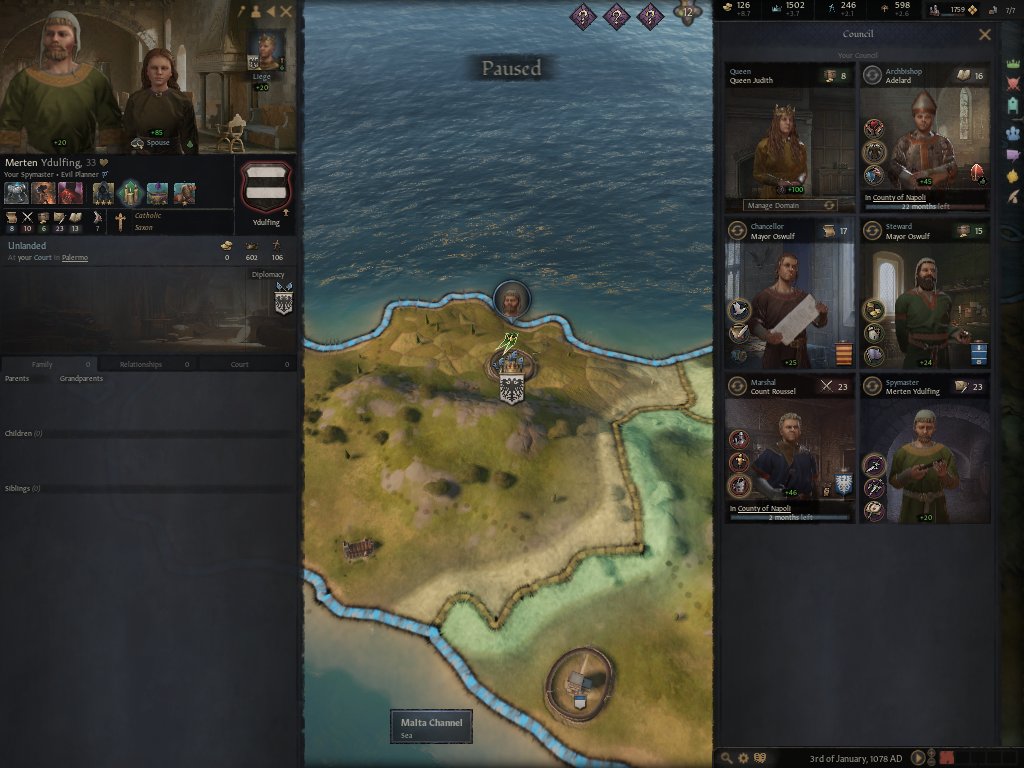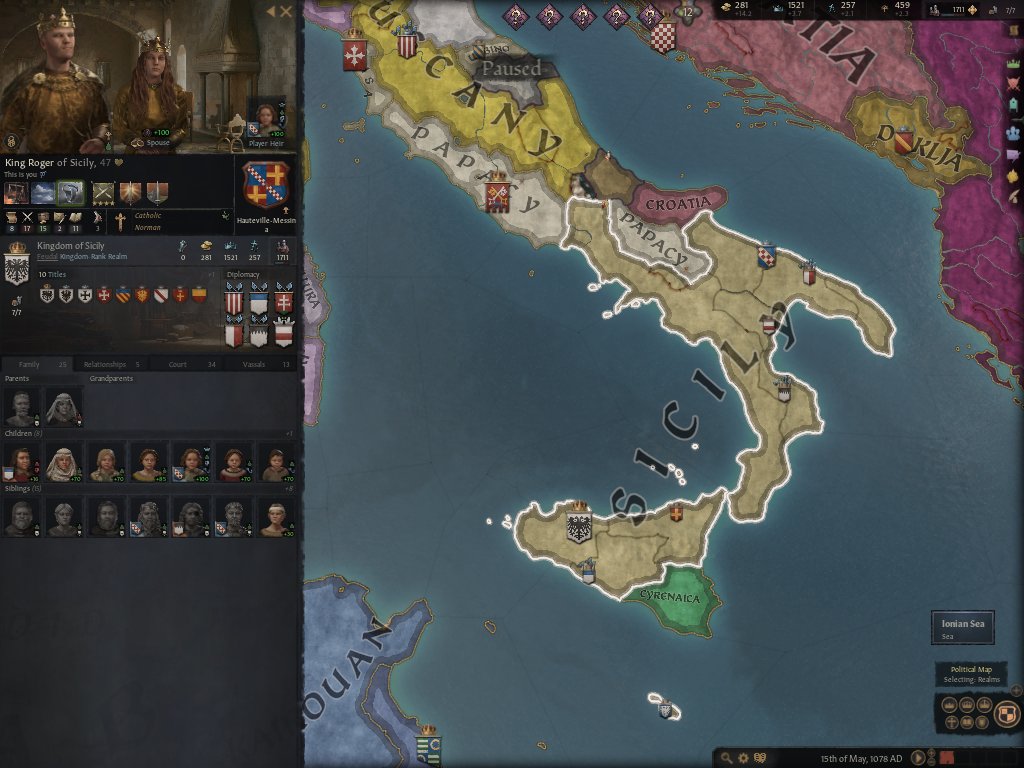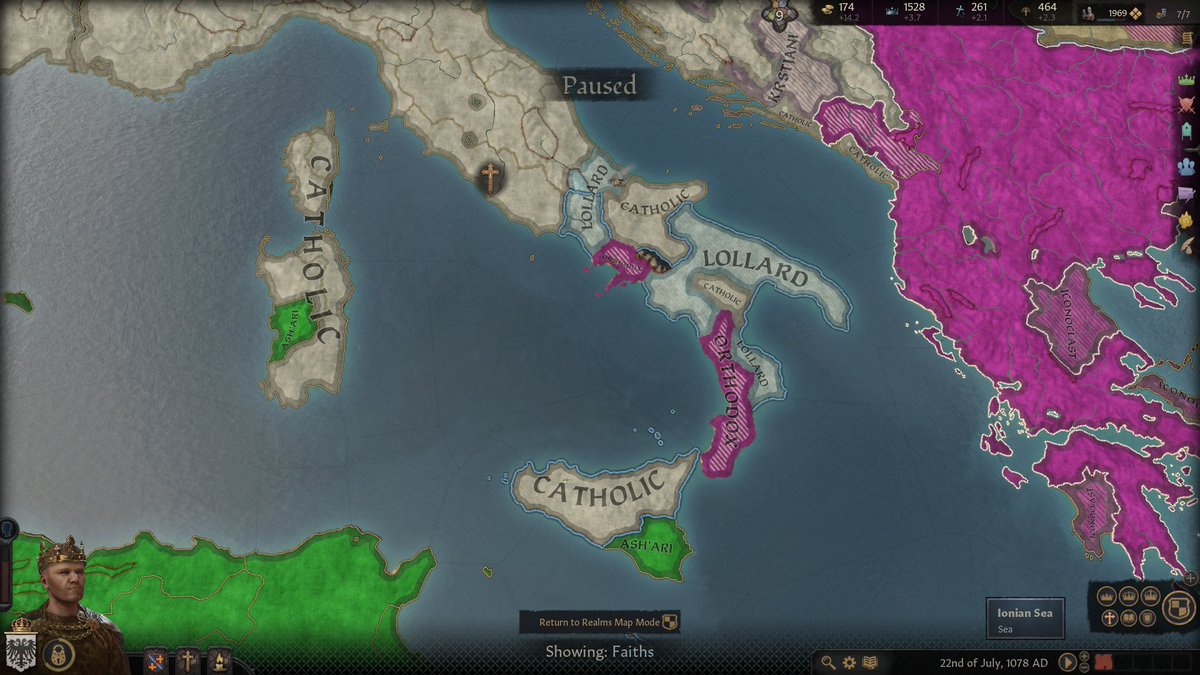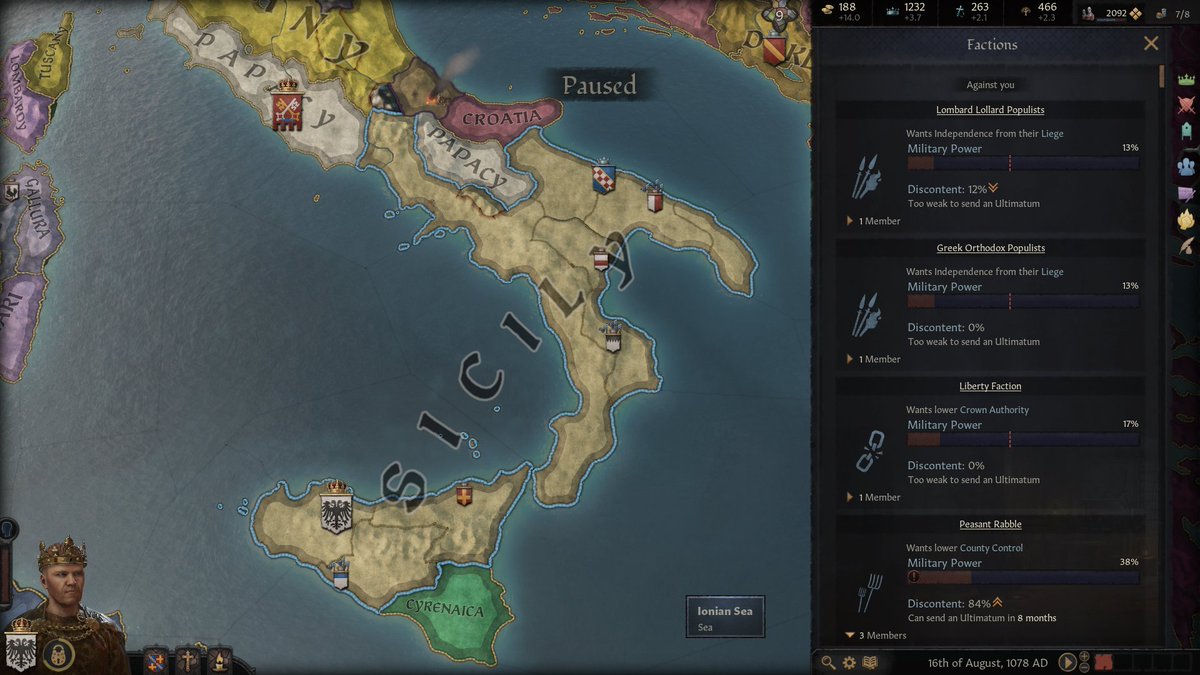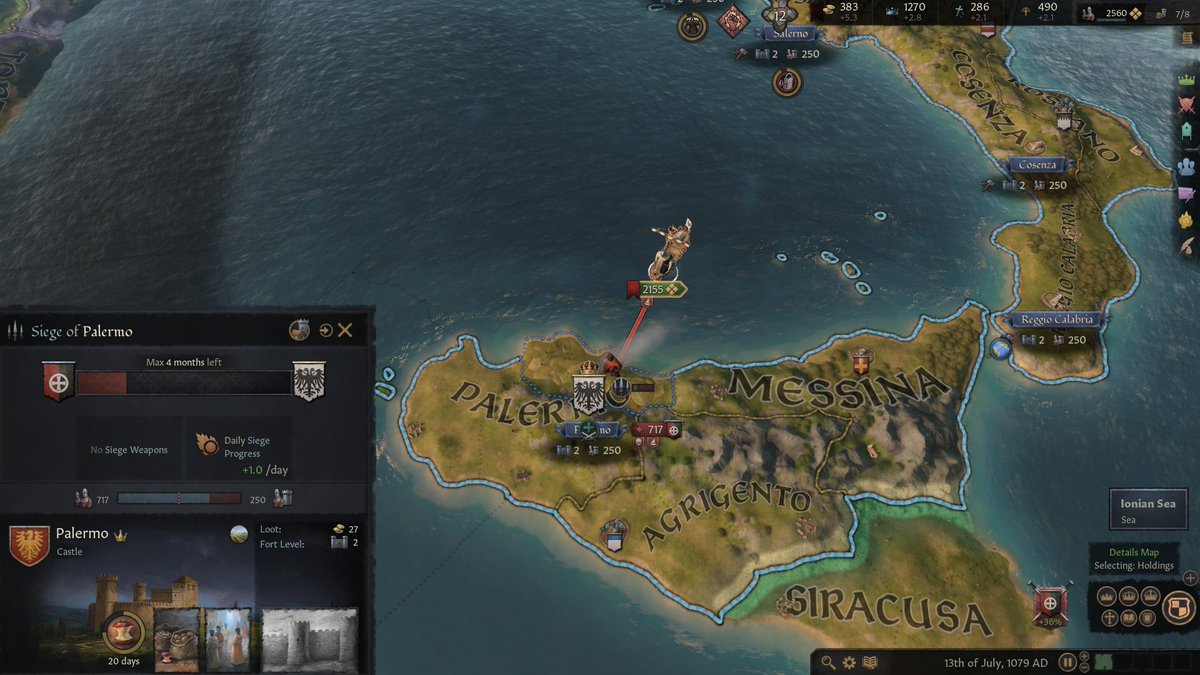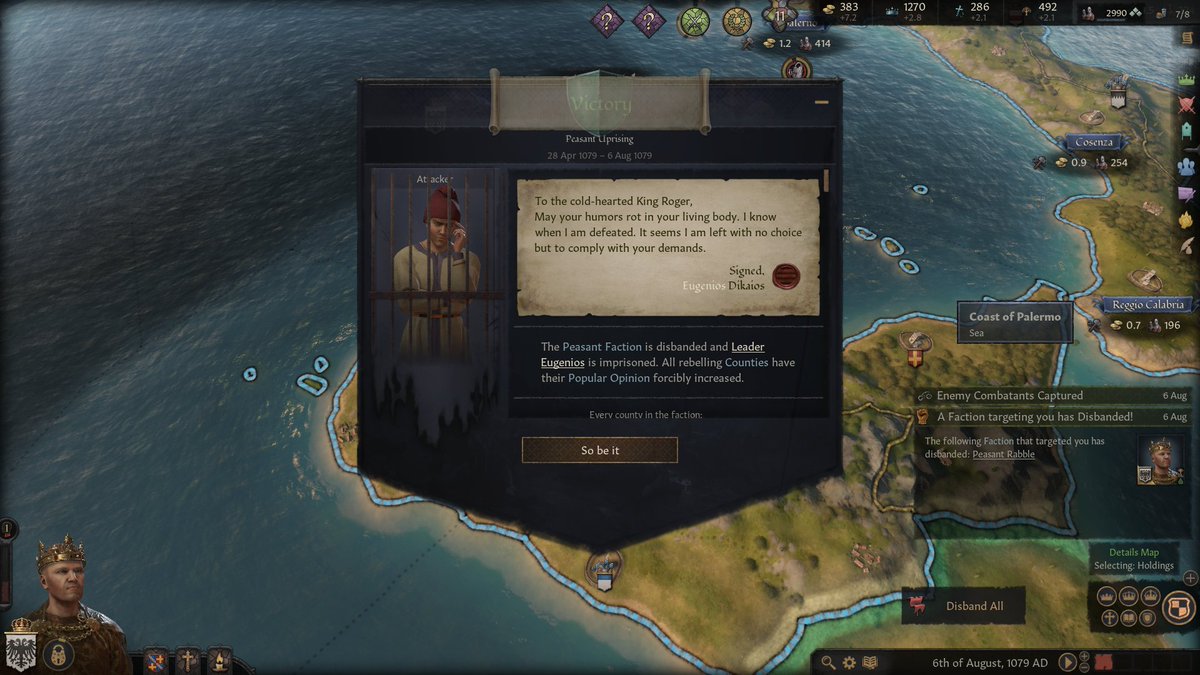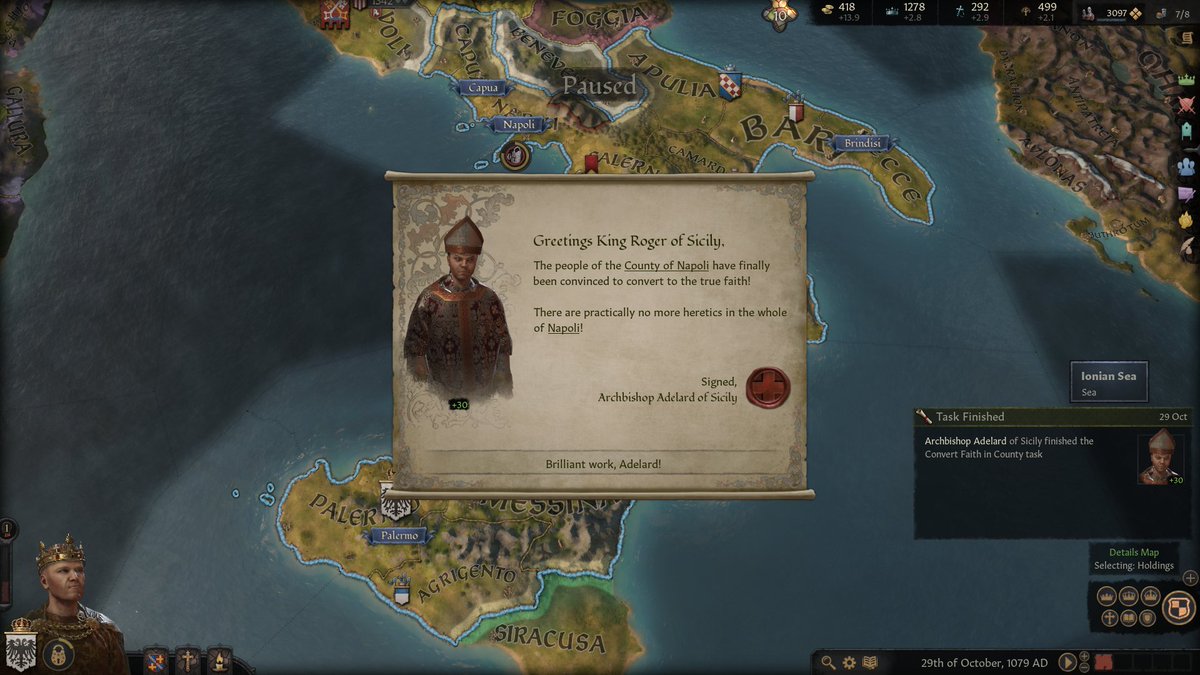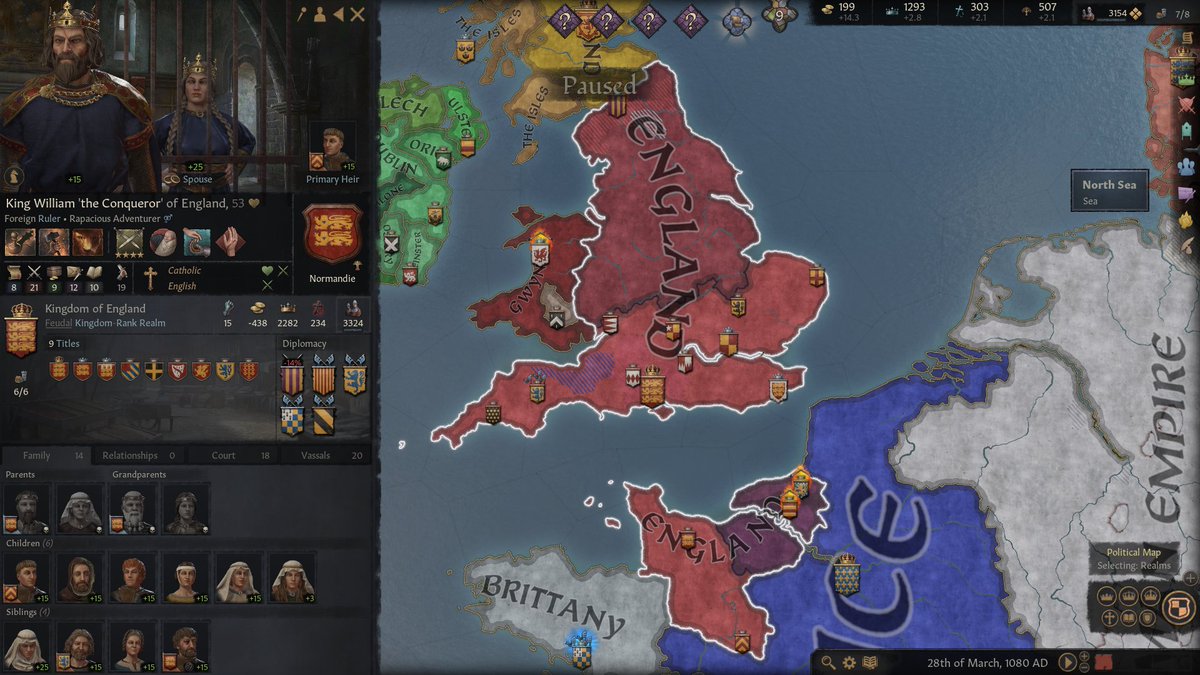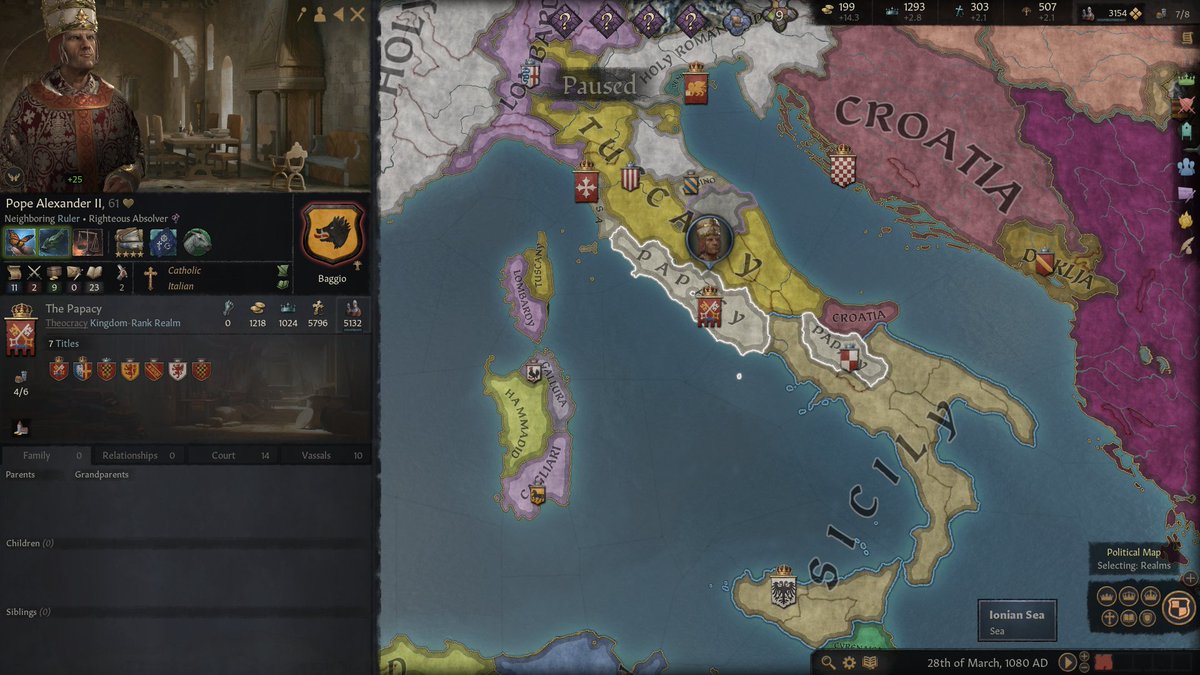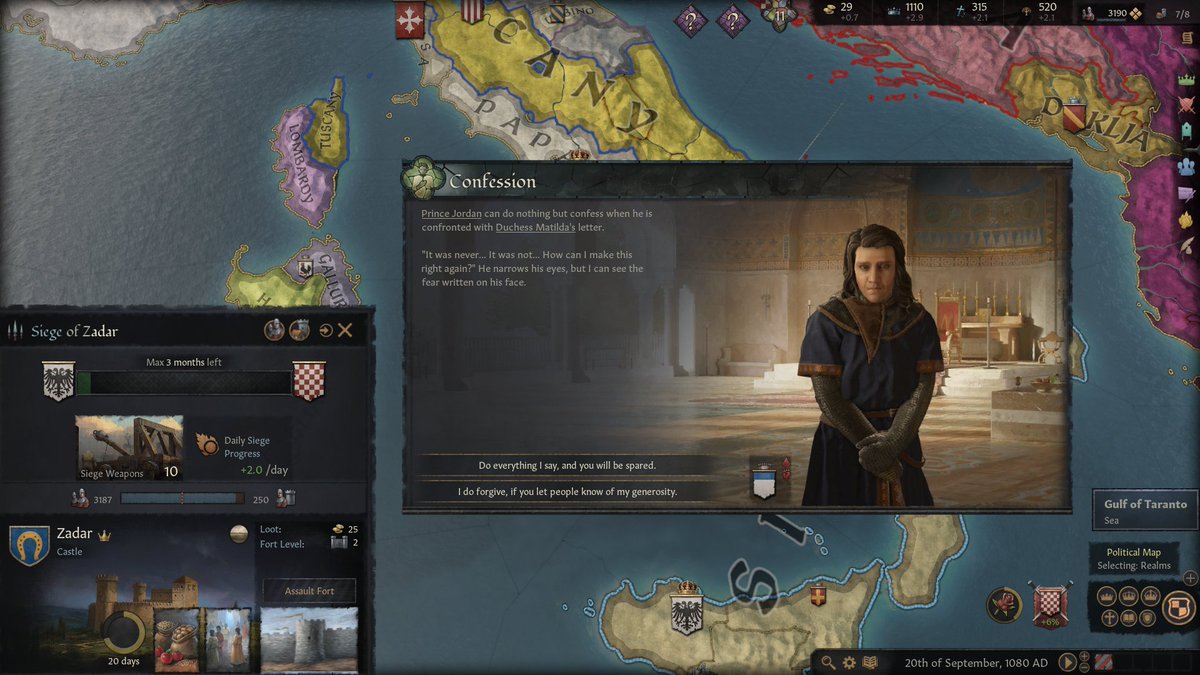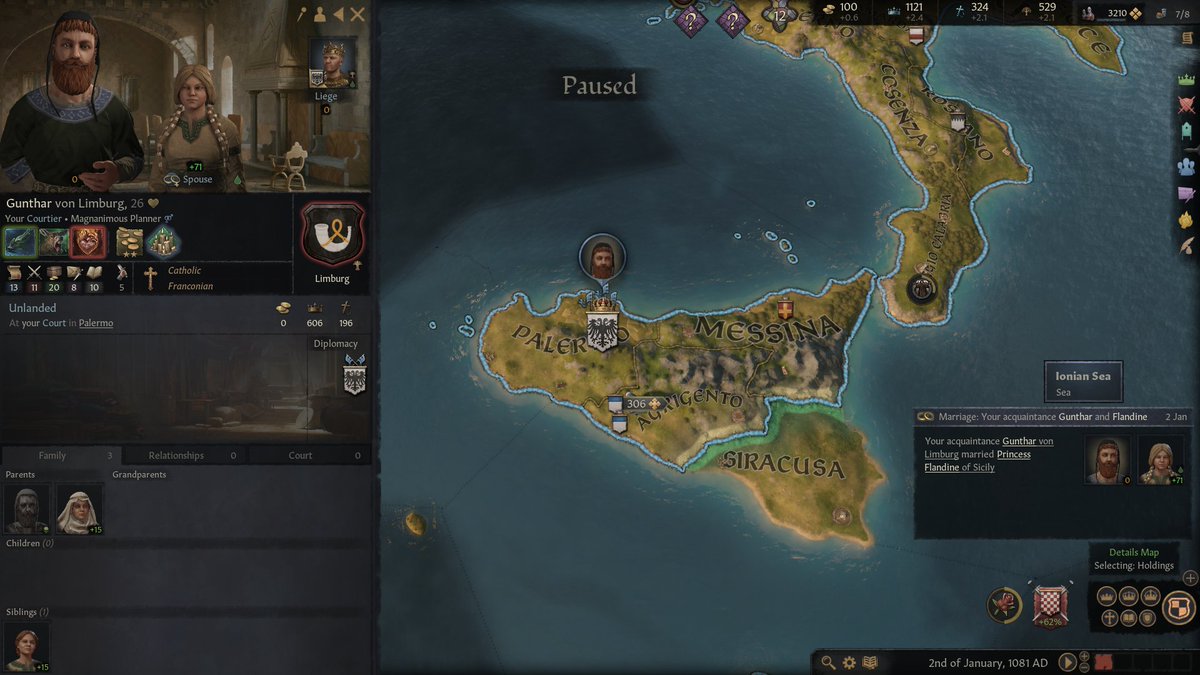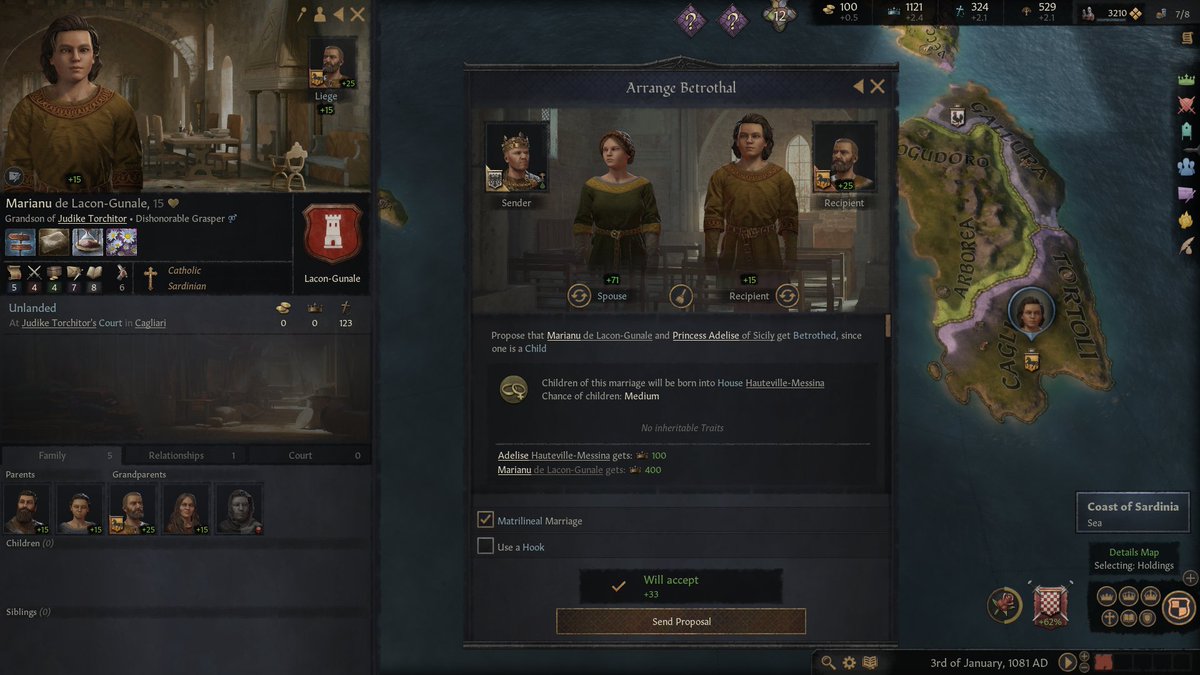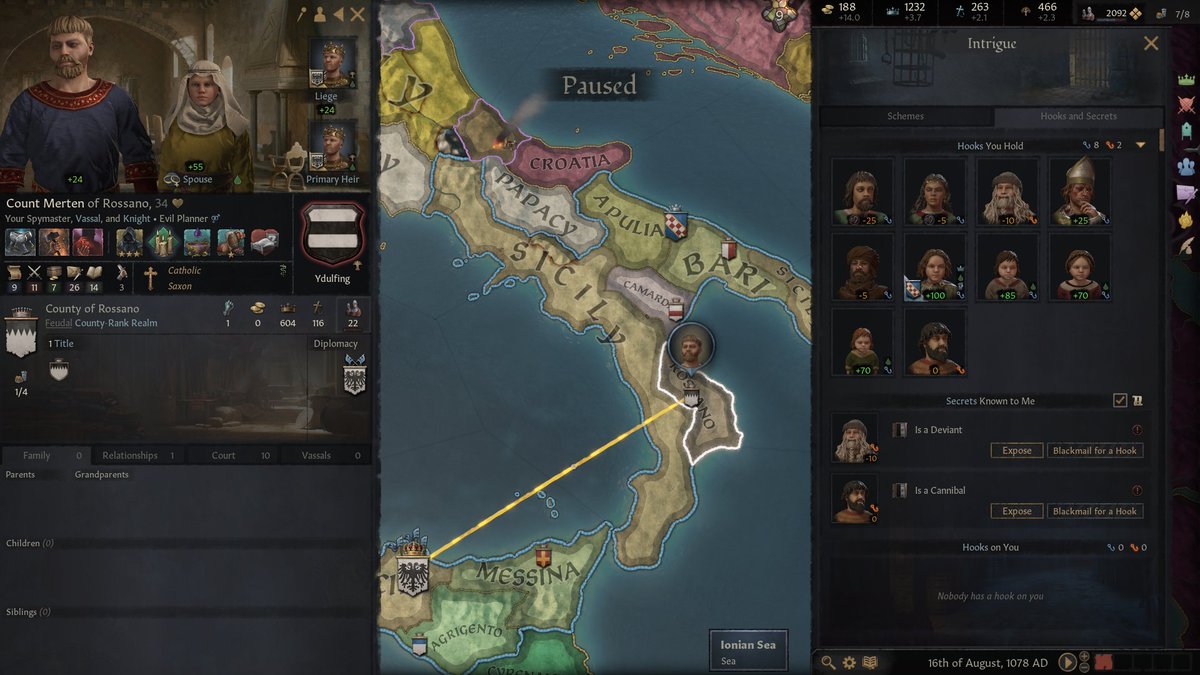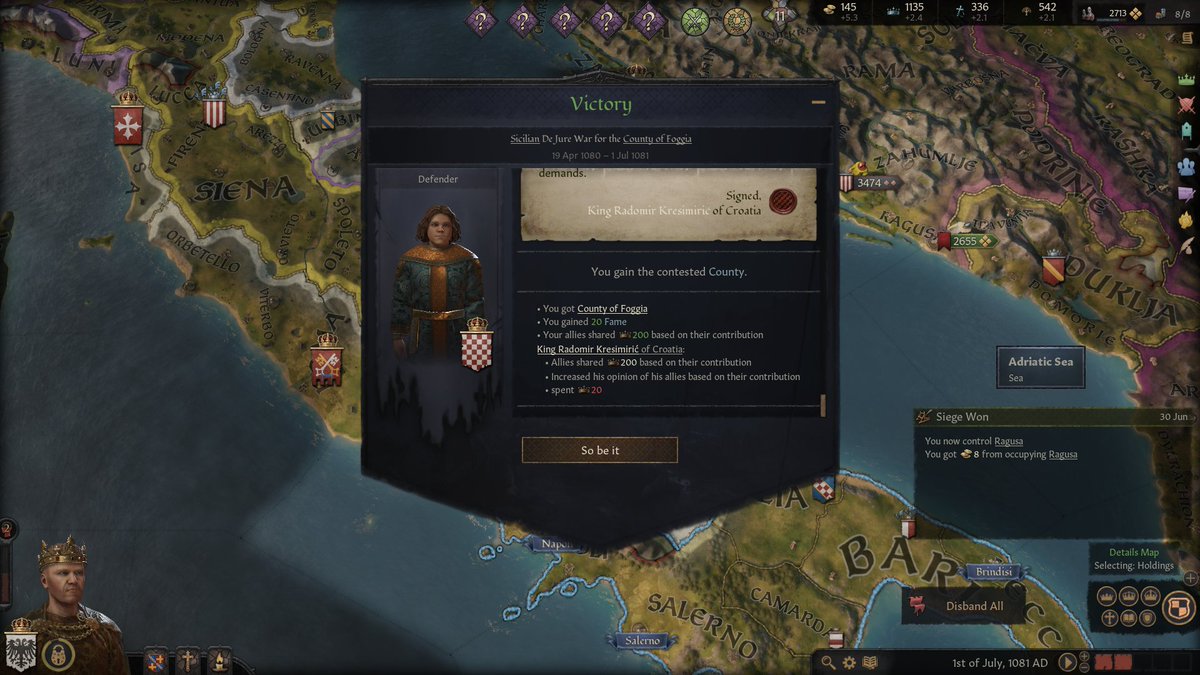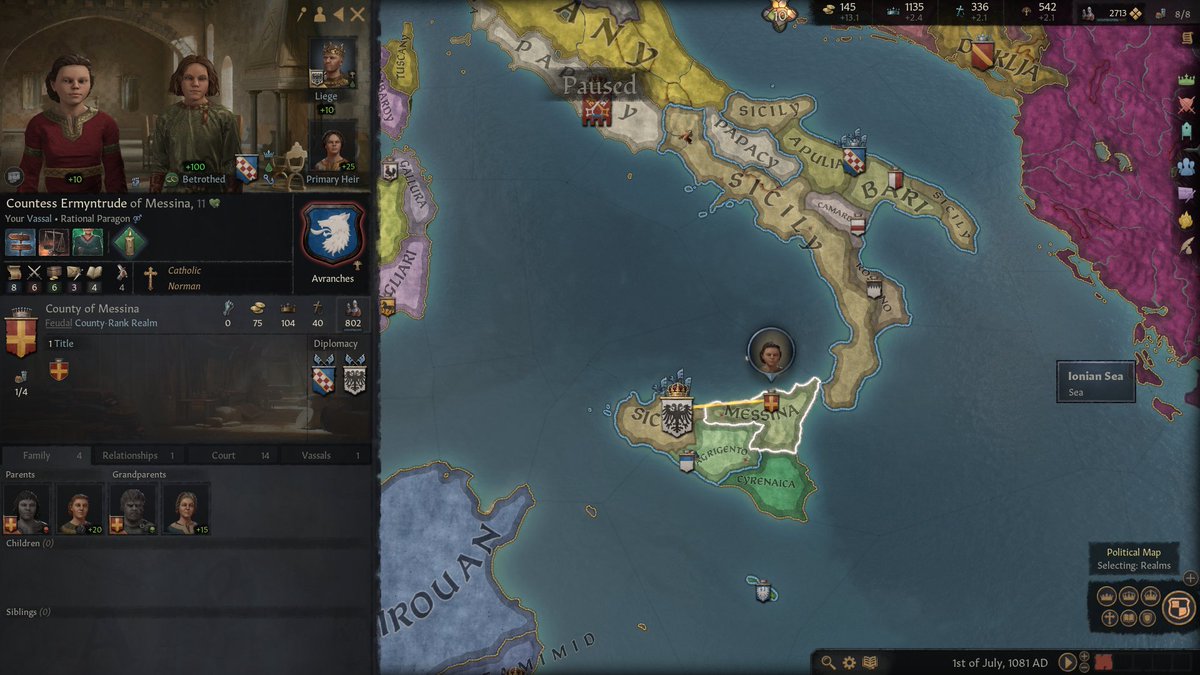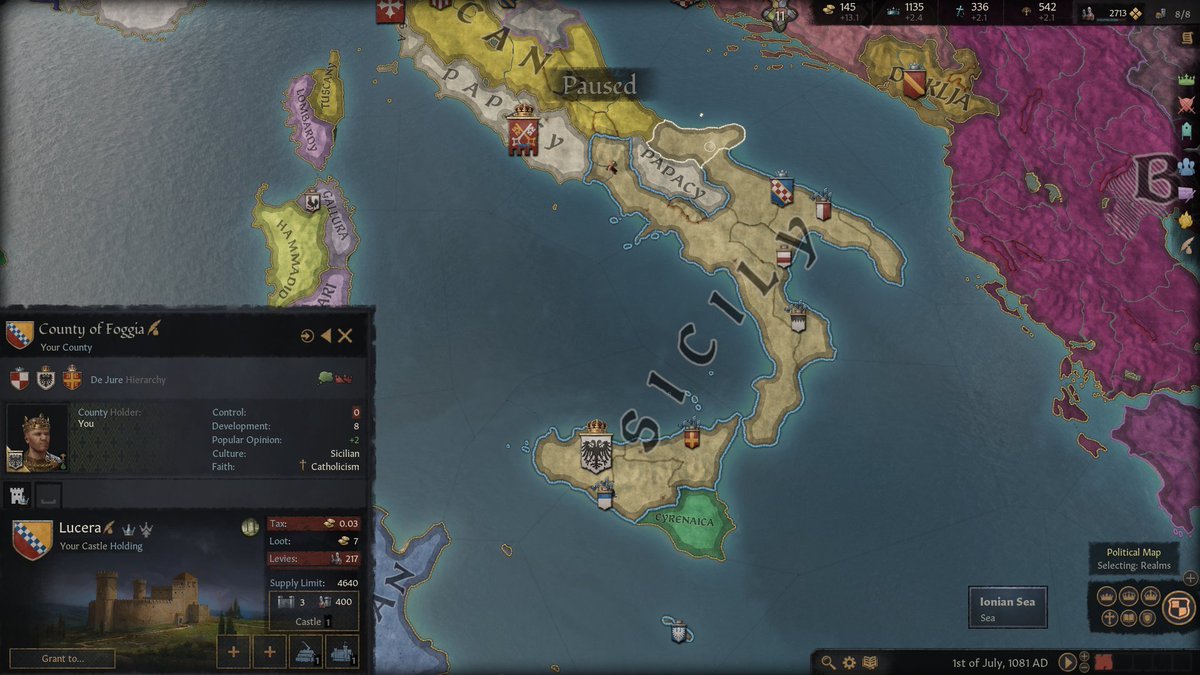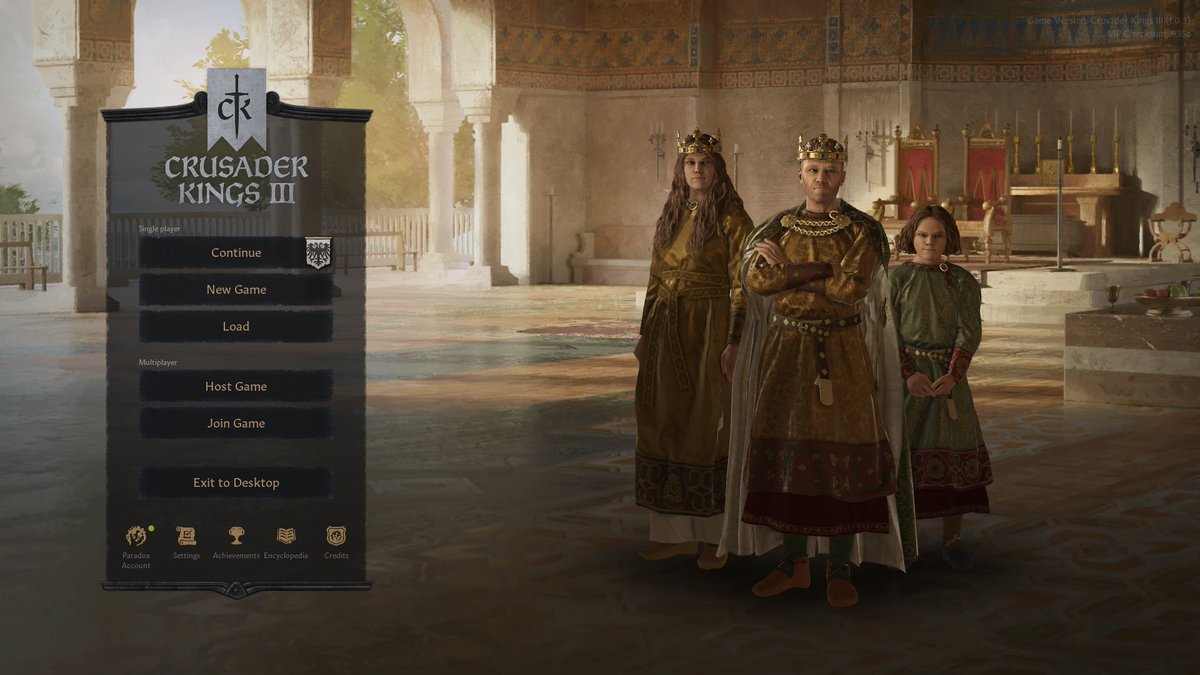1. I bet you need a distraction today. So do I. So here& #39;s my unfolding, in progress campaign in the new PC strategy game "Crusader Kings III". I& #39;m playing as Count Roger of Messina, who in real life founded the Norman Kingdom of Sicily.
2. Things start off in September 1066. Roger is one of a gaggle of Norman freebooting adventurers who have carved out domains in the former Byzantine provinces of southern Italy. Each of these territories is a "county", and the Norman-controlled areas are outlined in blue.
3. Roger controls three counties, outlined in white: Messina (his capital), Reggio Calabria, and Cosenza. He is calm, just, and chaste, and most importantly is an excellent military leader, with a special bent for fighting holy wars against "infidels".
4. I& #39;m not an independent ruler, though. I owe fealty to my elder brother, Robert Guiscard ("The Fox"), the Duke of Apulia. Robert only possesses two counties of his own, but he& #39;s ambitious, greedy, cynical, a great warrior, and everyone is scared stiff of him.
5. Robert has a young son, Bohemond, as his heir. My problem is that my only son, Jordan, is a bastard who cannot inherit. I also have three little daughters who will split up my realm if I die, and hand its pieces over to their future husbands.
6. The lands we inhabit is a cultural and religious frontier. Most of Sicily is Arab, and parts of southern Italy are still Greek, a holdover from Byzantine control (officially, our lands can still be claimed as part of the Byzantine Empire, if they ever get around it).
7. By the same token, most of Sicily is Muslim, and parts of southern Italy are still Eastern Orthodox. All of these difference could complicate any conquest and lead to future revolts.
8. But it also opens opportunities, because the Muslim rulers in Sicily are weak, and I can immediately declare holy war on them. I don& #39;t need Robert& #39;s permission to do it, and if I start the war, the counties I conquer will belong to me.
9. But first, two things: I seal a personal alliance with my liege, Robert, so I can call on his aid if I need it (and I may). Second, I fire the incapable marshal leading my army - a powerful mayor of one of my cities, who will be mad - and replace him with a better commander.
10. Meanwhile, I& #39;m handing over all my children, and the children of my court members, to competent guardians who will train them in the future skills best suited to their inclinations and abilities.
11. Sometimes I& #39;m going out of my way to arrange marriages between members of my court and skilled tutors who I find abroad, just to address this goal.
12. Back to conquest. I declare war on the ruler of Syracusa, demanding the county of Palermo - a very rich prize. Perhaps out of an excess of caution, I call on Robert to join me with his army, and after a short battle and two sieges, we quickly prevail. Palermo is mine.
13. Next I declare holy war on Agrigento. Wash, rinse, and repeat. Except this time, my neighbor calls on his own ally in North Africa to defend him. This keeps Robert busy to my rear, while I reduce Agrigento by siege. Barely year has passed, and most of Sicily is mine.
14. But I can& #39;t keep rolling. Calling on Robert twice has depleted my prestige. I have a truce with Syracusa which I can& #39;t break for a couple years. And I need to assign my marshal to suppress some remaining resistance in recently conquered Agrigento.
15. Meanwhile, the ruler of Naples has declared his own holy war on Syracusa and is about to conquer it. Not a problem. By controlling most of Sicily, I can eventually declare myself Duke there, and demand his allegiance, by force if necessary.
16. Because now I control several of the richest counties in southern Italy. My income is almost 10 gold pieces per month. And because Robert isn& #39;t Duke of Sicily, only Apulia, the taxes and levies I owe him are minimal. The army I can raise is now twice as large as Robert& #39;s.
17. There& #39;s a hitch, though. Even if I have the money (which I don& #39;t, yet), I can& #39;t declare myself Duke of Sicily, or anywhere else, as long as Robert is my liege lord, because he& #39;s only a duke too. I have to become independent.
18. I have two options: I can declare war and fight him, but that would incur the ignominy of stabbing an ally in the back, and he& #39;s still pretty powerful, so the war would surely be a long slugfest. I& #39;m not sure I have the resources.
19. The second option is to wait. He& #39;s over 50, which is old by medieval standards, and might die. His children will divide up his realm, and his young son Bohemond might be easier pickings. In the meantime, I can try to muscle in on Naples and Capua.
20. Meanwhile, at home, the new court members and mayors I’ve acquired from my recent conquests have given me a crack council, which gives me bonuses to my income and my army levies.
21. I don’t have a male heir, though, and I’m not getting any younger. I decide to “seduce” my wife in hopes of getting her pregnant. Since Roger is chaste, this stresses him out, but a man’s got to do what a man’s got to do.
22. So I get busy having my bishop manufacture a claim to Salerno, whole my spymaster ferrets out secrets in Capua (turns out one of the mayors is a cannibal, a secret which I can someday use to my advantage).
23. I settle in for my long-term plan to play out, with an eye towards my brother Robert’s health - which seems annoyingly robust. Then suddenly everything changes.
24. First, in 1068, Matilda of Tuscany claims the county of Lanciano from one of Robert Guiscard& #39;s vassals, and they go to war. Matilda is a heavy hitter who controls much of northern Italy and is allied with Venice. This could become a giant slugfest.
25. I wait for Robert to call on me as his ally against Matilda, but the call never comes. I consider offering to help, which would win me his friendship, but ... nah, let big brother dig himself out of this himself. Maybe he& #39;ll even get killed in battle.
26. Then, a few months later, the Prince of Salerno declares that he& #39;s converting to the heresy of Lollardism. Whoa - now I can declare holy war on him, at no cost to my depleted prestige, and without waiting to manufacture a claim on his single county.
27. I far outnumber Salerno& #39;s army, but it has two allies: Robert Duke of Capua, who I can also take without a sweat, and the more powerful Kingdom of Hungary. I& #39;ll be done with Salerno, though, before the Hungarians can even arrive on the scene.
28. Meanwhile, the Duke of Capua has converted to Lollardism too - no problem, man, the more the merrier. Then my own brother, Duke Robert of Apulia, converts to the heresy, along with most of his vassals, my Norman cousins!
29. Robert asks me to convert to Lollardism. Later he demands it. I tell him to take a hike. His war with Matilda is not going well, I& #39;m about to capture Salerno, and I have plans of my own that are taking shape.
30. When will I ever get a chance like this? Robert& #39;s armies are depleted and marching all over hither and yon, leaving his lands undefended. A whole bunch of his vassals and knights - my cousins - have been captured or killed. He& #39;s down. But what will it cost to kick him?
31. The cost will be high. Declaring war on Robert for independence will cost a ton of prestige on its own, plus double because I& #39;m breaking our alliance. My "fame" will drop to "disgraced". And I will be reviled by everyone for stabbing my ally in the back, for several years.
32. The alternative is to wait years, maybe decades, for Robert to die. I& #39;ll still have to fight his heirs. When will a better time come? I quickly wrap up my conquest of Salerno and prepare.
33. I can gain the prestige needed by declaring a "cadet branch" of the House of Hauteville. Robert will still be my liege (for the moment), but I& #39;ll head my own sub-dynasty. Robert approves and is even pleased at my decision. He has no idea what& #39;s coming.
34. I take a deep breath and declare war on my big brother, Robert. The betrayal is brutal. I march virtually unhindered into his lands and lay siege to first one, then the other of his castles. When his capital falls, I capture all of his family and court, including his wife.
35. Robert bitterly acknowledges my victory. I am an independent ruler now. I have enough money to quickly declare myself Duke of Sicily. I am now Robert& #39;s peer, but he& #39;s a fugitive from Matilda, while I& #39;m rich, powerful, and still hold his entire court in my dungeon.
36. But I am hated by many. My own bishop has revoked his approval of me, and refuses to contribute taxes or troops. It wasn& #39;t that much to begin with, but it stings. I& #39;ll have to work on swaying him my way - or let the passage of a few years cool his anger.
37. As Duke of Sicily, I can finally claim Syracusa from the Prince of Naples. But I can& #39;t declare war to pursue my claim (an easy conquest) until I earn enough prestige to no longer be "disgraced".
38. That won& #39;t stop me, though from waging holy wars against the Duke of Capua for being a Lollard, though. Nor against Robert Guiscard and his vassals too, if I want to. That might be a good way to earn some prestige back. I& #39;ll deal with Naples in due course.
39. I also need to build back my treasury, so I can declare myself Duke of Calabria and Duke of Salerno. That will allow me to parcel out some of the less valuable counties to knights and courtiers of my choosing, winning back their favor.
40. Meanwhile, wonderful news. My scheme to "seduce" my wife succeeded, and she became pregnant. The child ... was a son. A male heir, named William. I could have legitimized my bastard, Jordan, with some trouble, but this is a better solution that secures my succession.
41. Here is where things stand now. My expanded holdings are outlined in white. Note the last little tike among my five children now, my new son and heir. The fancier clothes for becoming a duke. The new crest for my cadet branch of the Hauteville family.
42. Now what to do about that cannibal mayor in Capua?
43. I must admit, I did not see the Lollards coming. But that and Matilda& #39;s war with big brother Robert - over an inconsequential county, at that - was a huge game changer.
44. Okay, as I mentioned, my disgrace from betraying my liege and big brother Robert, to declare myself the independent Duke of Sicily, meant I couldn& #39;t immediately claim Syracusa from the Prince of Naples, until I repaired my reputation.
45. But I could declare holy war on that heretic Lollard, the Duke of Capua, and seize his lands, which I did. So I wouldn& #39;t get overstretched, I granted the country of Agrigento to my bastard son Jordan, as my vassal.
46. I then went and launched another holy war to capture Malta, which I gave to my Marshal as a vassal, solidifying his loyalty as a key member of my court.
47. At this point, I didn& #39;t have much money, but I had a steady stream of income to replenish my coffers. What I did not have was the prestige I needed to get out of disgrace, so I could tackle Naples. (I can& #39;t pick on Robert again, because I have to honor our temporary truce).
48. I considered a couple of options. I could wait and pile up the money I needed to declare myself Duke of Calabria, which would win me enough prestige. But I don& #39;t like just sitting around waiting.
49. Alternatively, I could try to ally myself with some other ruler and fight in their wars, bringing me prestige. But that sounded unpredictable and potentially very costly.
50. I came up a better idea: sponsor a hunt. It cost some gold, but big brother Robert ended up paying for most of it by finally ransoming back his wife from my dungeons. And the honor it brought me made everyone forget my recent betrayal of him.
51. Getting my bishop back on board was even easier: I named him the guardian and tutor for one of my daughters. He was just flattered enough to start paying his taxes to me again.
52. And I had reason to like him too, because my bishop had been busy manufacturing a claim on Naples itself for me. Now I had a choice: I could only wage war for one of the Prince& #39;s counties, Naples or Syracusa, after which I& #39;d have to wait out the truce to strike again.
53. I went for Naples itself. It& #39;s a lot richer, and I figured it would leave him weakened, and as Duke of Sicily, I& #39;d always have a claim on Syracusa who I wanted to take it from him. My conquest went as easily as expected. I even raked in some cash by ransoming back his family.
54. Again, to avoid becoming overstretched, I needed to grant another country to a loyal vassal. I looked at the ledgers and realized my capital, Messina, was generating the least income. So I moved my capital to Palermo, and awarded Messina to one of my knights.
55. But uh oh, look what& #39;s happening while I was focused on Naples. First, Croatia launched a holy war against big brother Robert for being a Lollard, and conquered Foggia.
56. Foggia is part of the Kingdom of Sicily I& #39;m trying to form, and I& #39;m worried I might be on a collision course with Croatia and others eager to pick Robert& #39;s bones clean, in the wake of his bloody war with Matilda and his colossal mistake embracing that stupid heresy.
57. But something else has happened - Syracusa, its ruler weakened by my war on Naples, has fallen to the Muslims. At first I thought it was a local rebellion - the province& #39;s stability was already looking shaky - a development that would give me a chance to conquer it back.
58. But no, it fell to some Libyan lord ... okay, I should be able to take him. But no, he& #39;s actually the vassal of the ruler of Cyrenaica. If I declare holy war on him, I have to fight his boss, who has a bigger army than I do. And now I& #39;m worried he might attack ME.
59. Robert was my ally, and he played a big role in helping me out during my early wars to conquer Sicily. But I betrayed him to win my independence, and now I don& #39;t have any allies. Maybe I need some. Maybe I need to marry off some of my young daughters to get some.
60. Meanwhile, my realm (outlined in blue) is divided among a host of religions. I& #39;ve got my bishop assigned to converting Palermo, but each county will take years to claim for the Catholic faith. Until then, I could face local unrest and even rebellions.
61. The divisions on the cultural and religious frontier made conquest easy, but they& #39;re going to make holding on to it more difficult. What I need to do is pile up some money so I can declare myself Duke of Calabria, then King of Sicily.
62. I can only hope big brother Robert hangs on until then, and isn& #39;t replaced with someone stronger in a better position to resist my claims to the rest of southern Italy. And I hope the Libyans just stay put in Africa.
63. On second thought, maybe I should have gone after Syracusa first, when I had the chance. But if I had, maybe I& #39;d be kicking myself that someone grabbed rich Naples from under my nose. Anyway, what& #39;s done is done.
64. Oh, my wife the duchess is pregnant again. Should I hope for a boy or a girl? They say you need "an heir and a spare", but I don& #39;t have primogeniture yet. If there are multiple sons, they will divide up my realm when I die. I need to found the Kingdom of Sicily first.
65. I& #39;m going to start calling this my "Make Sicily Great Again" thread.
66. Here’s my family in 1071: Duke Roger of Sicily, his wife Duchess Judith, and his baby son and sole legitimate male heir William.
67. The next few years were a period of biding my time, as I accumulated the substantial funds needed to declare myself Duke of Calabria and then King of Sicily, while keeping an eye on my household and developments in the region.
68. I only fought one war: the Muslim ruler of Sirta, who had captured Syracusa from under my nose, launched a holy war against big brother Robert Guiscard for Rossano. I have no love for Robert, but I had no desire for the Libyans to gain any further foothold in southern Italy.
69. Because the Chiefain of Sirta had launched this holy war on his own, I could help in fending him off without sparking a bigger war with Sirta& #39;s more powerful overlord, the High Chieftain of Cyrenaica. (Robert had his hands full fighting off other attackers at the moment.)
70. The war was quick. I fought off his (paltry) invading army, then laid siege to Syracusa, and it was over. Because I was defending Robert, I couldn& #39;t keep Syracusa, but I did gain some prestige and some ransom money from prisoners.
71. I had to interrupt my efforts, briefly, to deal with a Lollard uprising in Salerno. I got there just in time to easily defeat their rabble, and executed their captured leader by burning him at the stake, to set an example.
72. Unlike big brother Robert, who strikes terror into everyone, like a wounded lion, Roger is more admired than feared. My latest victory over the invading Libyans further boosts both my stature and my piety, to modestly respectable levels once again.
73. Robert himself is over the moon at my defending him. My betrayal is forgotten. His affection for me skyrockets. He considers me his closest friend. How sweet. I& #39;m just waiting for the old lion to die, so I can seize his lands from his heirs.
74. In fact, our truce is over, and I could declare holy war on his stupid Lollard self and grab his entire duchy right now. But he is allied with Epirus, which has an army as big as mine and is marching up and down Italy in Robert& #39;s defense. That could be bloody. Better to wait.
75. Someone just asked me about hiring men-at-arms, my own trained soldiers. I could. It would give me a better chance against Epirus. So far I& #39;ve been relying on my peasant levies, which don& #39;t cost anything to maintain in peacetime, while I build up my cash. First things first.
76. I have enough money to declare myself Duke of Calabria, which I already control most of. One more step towards declaring myself king. Despite some boiling local tensions from religious and cultural differences, the money is steadily flowing in.
77. My wife gives birth to a daughter, who doesn& #39;t threaten my young son& #39;s sole claim to my realm when I die. My vassals are all reasonably happy, which allows me to strengthen my crown authority a bit, without losing their favor. I can now revoke their titles, if I need to.
78. I release the remaining prisoners I captured from Robert - none of them are particularly talented, nor are they going to generate any ransom. But I force them to convert back from Lollardism first. Maybe that will give Robert some grief in his court.
79. Finally, by 1075, nine years into the game, I have the money to declare myself King of Sicily. I now have a valid claim to all of southern Italy, no matter who holds it. And my heir William will inherit that throne, even if I end up with other sons to claim my lesser titles.
80. As king, I should be able to force big brother Robert - my former liege - to become my vassal as Duke of Apulia. Because I won that holy war for him, he& #39;s even willing - EXCEPT that he& #39;s a Lollard. The religious gap is too big a leap for him. He will refuse.
81. What can I do to get him to "yes"? It would solve so many problems, and unify my kingdom without cost in blood or treasure. Can I get him to convert back, somehow? Does he have some secret I can leverage? I don& #39;t know. This is the big question.
82. The other big question I face is rising unrest, from all the religious differences in my kingdom: Muslims, Greek Orthodox, Lollards. All have formed factions and are conspiring to revolt at some point.
83. My bishop has succeeded in converting my capital, Palermo, to Catholicism. That helped defuse another revolt that was about to break out. I& #39;ll work on Naples next, but each county takes several years to convert.
84. Defeating rebellions in the meantime is relatively easy, from a military point of view. But it& #39;s costly, and wreaks havoc on local control and my tax revenues, for many years after they& #39;ve been crushed. Absorbing Robert& #39;s Lollard domains will make this challenge even tougher.
85. One interesting development: when I declared the Kingdom of Sicily, most of southern Italy spontaneously adopted Sicilian culture. I& #39;m still a Norman. It may make sense for me to adopt Sicilian ways, to fit in better with the majority of my subjects.
86. Here is my family in 1075. King Roger of Sicily, Queen Judith, and my heir William, who is growing up. I& #39;m told he is very charming, which means he may be cut out more for diplomacy or intrigue, rather than the military battles that have defined Roger& #39;s rise to power.
87. After Roger& #39;s life is completed, I& #39;ll link to separate thread comparing and contrasting my game with his real historical life. And I& #39;ll start on a new thread - hopefully! - continuing my game as his successor.
88. Meanwhile, here& #39;s part of a tapestry showing Roger& #39;s actual marriage to Judith in 1062, after his initial conquest of Consenza - four years before my game started.
89. My 7-year old daughter says it looks like I& #39;m playing Risk.
90. Now take a seat and prepare yourself for a tale of glorious triumph and terrible disaster, a saga worthy of song that unfolded on my computer screen this evening. The clash of two brothers, torn by ambition, faith, and fate: Robert of Apulia and Roger of Sicily.
91. Despite my cruel betrayal to carve out my own kingdom in Sicily, my fierce older brother& #39;s love for me knows no bounds. He is profoundly grateful that I defended his lands from invading infidels, while he was busy fighting other vultures who swooped in following my betrayal.
92. But I only did this because I covet his lands myself. As king, I claim all of southern Italy, but he possesses almost half of it. I would happily have him for my loyal vassal - and he would have me, but his stubborn embrace of the Lollard heresy prevents him for accepting.
93. I could declare holy war and take it from him, but the old fox is allied to the Duchy of Epirus, which has an army as large as my own. Combined with him, they are too great a match for me. Even if I ally with Epirus myself, they will defend him from me if I attack.
94. How can I threaten Epirus, dissuading them from coming to Robert& #39;s aid, or at least beating them on the battlefield if they do? I have some ideas. My youngest daughters - barely toddlers - are central to my plan.
95. My 3-year old daughter I betroth to the 5-year old son of Matilda of Tuscany, her only heir. Surprisingly, they even agree to a matrilineal marriage, meaning they will belong to my dynasty, not hers. Tuscany will now came to my aid when called, but is it enough?
96. My newborn daughter (my wife just had another), I betroth to the 2-year old son and heir of the King of Hungary. She will go to them, when she comes of age, but in the meantime, powerful Hungary will come to my aid as well. Within mere weeks, the trap is set.
97. I declare holy war on beloved Robert, claiming the Duchy of Apulia for myself. I call on Tuscany and Hungary to aid me, and they accept. Epirus is undeterred, and comes to Robert& #39;s defense.
98. The war is brutal, with several large battles as the armies converge on Robert& #39;s domains, but I& #39;ve weighted the odds heavily against him. One by one, his castles fall to my sieges. One by one, his warriors, advisors, and family members are captured or slain.
99. Achaea, another Byzantine dukedom, comes to his aid as well. They are welcome. They add little except valuable captives for me to ransom, earning me a small new fortune despite the costs of fighting the war.
100. Finally, the war lost, Robert is forced to surrender. I seize all three counties of Apulia from, leaving only two remaining counties from his realm that were outside the duchy itself. To add insult to injury, I use money I took from him in ransom to usurp the ducal title.
101. Robert& #39;s foolishly loyal vassal, Count Abelard of Camarda - my own nephew, who refused my entreaties to join me against him - was so disfigured in battle that he must wear a mask. Robert& #39;s loss of the duchy means he is now "free" - to face my wrath alone.
102. The great Robert Guiscard - my former liege lord - is now merely the Count of Rossino. He has lost an eye in battle. But he has also lost his firstborn son and heir, Bohemond, killed. So much loss and death has given him the trait "frozen grief", impairing his health.
103. Robert, unlike Abelard, is protected by the terms of our truce that won me Apulia. I cannot attack him, and will help defend his land from others if they try to take it. Because when someone does take it, that someone is going to be me.
104. Robert has lost all his allies. Epirus will no longer come to his aid, and I doubt any powerful lord will rush to marry their daughters to his remaining brood and ally themselves with a pitiful count, no matter how personally fearsome he remains.
105. Robert could have been my vassal and true friend - and brother. But his embrace of a heresy made that impossible - not for me, but for him, at least on the terms I was willing to allow. My terms. His fall.
106. And two little girls, barely able to walk or talk, made it possible. In turn, if fate allows, they will become a duchess and a queen.
107. Notice, bizarrely, though, that on his profile Robert still likes me. A lion respects other lions, I suppose. And shared blood washes away many sins.
108. People asking me "Why Lollards? Don& #39;t they belong in 14th Century England?" Yes. I think heresies spawn randomly in the game, when a religion& #39;s fervor dims, either because of expansion or scandals (for example, a bishop& #39;s embarrassing secret is revealed).
109. After the epic defeat of Robert, in 1077, I thought things would calm down. A little bit of mopping up, and then settle down to some housekeeping. Well, things didn& #39;t calm down, but the housekeeping still couldn& #39;t wait.
110. The court of every ruler, from large to small, in CK3 is made up of people who want something: a job, a title, a war, a change in religion ... and they& #39;re all related to each other in ways that make it even more complicated.
111. I knew the role certain people were playing in my court, but I needed to dig deeper and get to knew each person and their motivation, because I had some decisions to make, including who to hand the three new counties in Apulia I had just won over to, as vassals.
112. Okay, so first of all, there& #39;s my bastard son Jordan, who rules under me as Count of Agrigento. He wishes he had a seat on my council, but he& #39;s not that qualified. Still, he generally likes me. I married him to a genius woman and he now has a little genius daughter.
113. Then there& #39;s Roussel, a knight who I made my marshal, or top military commander. He rules Malta for me, as his reward. He is vengeful, zealous, and sadistic - but capable, and I have his loyalty. Since he has no children, Malta will revert back to me when he dies.
114. Oswulf, a mayor of one of my cities in Reggio Calabria, serves as my Chancellor, or chief diplomat. He is fickle and compassionate (as well as gluttonous), qualities which help him foster positive attitudes towards me at home or abroad, whichever I direct him to focus on.
115. The problem with mayors is that you can& #39;t grant them feudal titles. If you promote them to run one of your counties, it turns that county into a republic - which pays more taxes, but provides fewer soldiers.
116. What that ends up meaning is that your vassals, who do hold important feudal titles, think they deserve positions on the council, and are annoyed when you keep more qualified mayors in those jobs. And you can& #39;t do much to change that.
117. So right now I have another Mayor Oswulf, this one from just west of Palermo, as my Steward. He is greedy and deceitful (as well as brave), but pretty good at handling the money, helping to boost my tax revenues.
118. I also have another mayor, who I forgot to take a picture of, serving as my spymaster, helping to ferret out secrets and prevent plots from being hatched against me. He& #39;s similarly well qualified for his job (around 17).
119. Agdun is my court physician, who helps any members of my court who are wounded in battle or stuck with illness. He is an Arab I captured during my conquest of Sicily and, noticing his high learning skill, released on condition that he convert his religion and join my court.
120. My other vassal, at the moment, is Richard. He is brave, arrogant, and gluttonous, but a solid knight on the battlefield, so I gave him Messina to rule on my behalf. But he& #39;s not happy that I tightened royal authority, and I need to keep an eye on him.
121. If I had been smarter, I would have forced Richard to marry one of my daughters, while he was still at my court, with the children going to my house, THEN appointed him count. I& #39;d have a much firmer hold over him. That& #39;s a lesson I& #39;m going to apply in the future.
122. In any case, Richard& #39;s son and heir is named Hugh, and he likes me a bit more. He& #39;s also a very capable man on the battlefield, which we need. He is wrathful, brave, and gluttonous. The d& #39;Avranches are a lovely family.
123. Now here& #39;s the thing: I& #39;ve got three counties and a duchy title (of Apulia) that I have to hand out, because otherwise it pushes me over my limit for both, which causes me to lose tax revenue and my vassals to resent me. Can& #39;t have that.
124. And I need to do it now, to remove those penalties, even though I& #39;m planning to immediately go to war against my Lollard nephew Abelard holding out in Camarda. And at the same time, I have three unbetrothed (though still underaged) daughters, who may factor into all of this.
125. Besides my underage son and heir, I have two groups I can draw on. First, there& #39;s my own cousins, the de Hautevilles, particularly four nephews, sons of my brother Ranulf, two of whom have served me, and two others who came into my clutches after serving big brother Robert.
126. Second, there are the young de Briquessart family, three brothers and one sister, whose mother was the daughter of Richard d& #39;Avranches (of Messina). They& #39;re somehow members of my court and I& #39;ve been looking after their education. Some show potential talent.
127. After thinking through a wide range of options, I name my young son and heir William as the new Duke of Apulia, with the county of Apulia itself as his domain. The de Briquessarts aren& #39;t ready yet, and I don& #39;t want my de Hauteville cousins ruling the roost there alone.
128. I considered marrying one of my daughters to either a foreign suitors or one of the de Briquessarts, but since she& #39;s not of age yet, I worry they might break the betrothal once they gain hold of the duchy.
129. I should take a moment to explain the concept of "matrilineal marriage" here, because it plays a key role going forward. Basically, if my daughter marries an "inferior", instead of sending her away, I can demand they join my court and the children all belong to my house.
130. But what if she& #39;s too young to marry, they get betrothed, and I appoint that man a duke or something? In theory, she& #39;ll become his duchess someday. But what if, now being duke, he thinks twice about a matrilineal match? He could break it off. Better to marry them first.
131. Anyway, with the war on nephew Abelard already kicking off, I marry my proven knight (and nephew) Ranulf de Hauteville to a lady of my choosing and make him County of Bari. He takes his brood of de Hauteville brothers with him, to form his new court.
132. For the moment, I make Ranulf MY vassal - he& #39;s a good knight and I need him - not my son& #39;s. Bari is part of the duchy of Apulia, so I can transfer Ranulf to William if and when I wish, but for now he& #39;s directly under me.
133. Complicated? Yes, but finally settled. And by the way, I& #39;m thinking ahead. I& #39;ve betrothed my two eldest daughters in matrilineal matches to two extremely talented but unknown foreigners. When they each come of age, I will get an infusion of new talent - as part of my family.
134. Now to war, to take the holdout county of Camarda. I choose to exert my claim as King of Sicily, instead of launching a holy war, because I don& #39;t want to boost the fervor of the Lollards any more than necessary, since my realm is already chock full of them.
135. It should go easily, but it doesn& #39;t. Count Abelard is a wily fighter, and he has a strong castle. While I& #39;m reducing it with my mangonels, instead of sending to fight me with his weaker army, he takes it into my lands against my weaker castles, so I have to go chasing him.
136. Meanwhile, big brother Robert, in his rump county of Rossano, faces a peasant revolt. Suddenly and shockingly, he is killed by them - one imagines a Gaddafi-like scene - and his son Roger inherits. He does not inherit my truce with Robert. I can now attack any time I want.
137. What a sad way for the great Robert Guiscard, my former liege lord and fiercest rival, to go.
138. But I& #39;ve got a war with nephew Abelard to finish - and finish it I do. He retains his domain as count, but I require him to convert back from Lollardism. He grudgingly agrees, and for a modest donation of gold agrees to convert his county back too.
139. I get the money back from him anyway by ransoming the family members I captured. Boy, he really really hates me, but he& #39;s also terrified of me, and he& #39;s an excellent knight in my service, whether he likes it or not. I can only imagine what he looks like under that mask.
140. I don& #39;t skip a beat. I declare war on Robert& #39;s son Roger, to take back Rossano, now that I can. I expect it to play out much the same way. The siege itself is far quicker, and the young lord surrenders.
141. I offer him the same deal as Count Abelard: convert back from Lollardism, and convert Rossano with you. But unlike Abelard, he refuses. Young Roger cannot - or will not - bring himself to abandon the Lollard faith.
142. I order him arrested, and he is brought to me. I used my power as the head of the Hauteville dynasty to claim Rossano myself, and revoke his title. He is now free to worship as he wishes - and rot away in my dungeon.
143. While I was fighting the war, my oldest daughter, Princess Matilde, turns 16. She can now wed the talented nobody foreigner Merten Ydulfing. She may not be happy at the loss of prestige, but I have gained a new super-talented spymaster for my council.
144. When I strip young Roger of his titles, I have my chance to promote the young couple. I name Merten Count of Rossano. His children will belong to my house, and hopefully inherit his intelligence, as well as the county ... and perhaps, if I choose, even the Duchy of Calabria.
145. That& #39;s you expand your dynasty, improve its bloodline, recruit "the best people", and impose your control all at the same time. At least in Crusader Kings III.
More to come.
More to come.
147. I forgot to mention that, in my war to take down the young Roger of Rossano, my knight and vassal Richard d& #39;Avranches was slain, leaving his son Hugh as the Count of Messina. Now that he& #39;s my vassal, he inherits his father& #39;s envy of me. His only heir is his young daughter.
148. My subjects are sick of war, and it& #39;s beginning to annoy them. I need to spend some years consolidating my conquests of Sicily and southern Italy. As I& #39;ve mentioned, my biggest challenge is the religious and ethnic diversity of my new kingdom.
149. This diversity has given rise to a host of factions that seek to rebel against me. Some are moving dangerously close to striking - unless I can figure out a way to defuse them.
150. Fortunately, my capital of Palermo adopts Sicilian culture, enabling ME to make the transition from Norman to Sicilian ways. Several of my vassals adapt with me. This makes our rule a lot more palatable to our subjects, and helps defuse several of the nascent rebellions.
151. Not all of them, however. In 1079, the peasants of Naples, Cosenza, and Reggio Calabria rise up. Ostensibly, their demands focus on greater liberty, but their Greek Orthodox faith played a key role in stirring unrest. I reject their demands, and will crush them.
152. I defeat the peasant rabble easily in Naples, but the mobs from Calabria have besieged my capital Palermo. Once my army arrives, however, they are quickly dispersed.
153. Instead of executing the leader, however, I recruit him as one of my knights. He detests me, but fears me. He may prove useful on future battlefields - or I may end up regretting my decision.
154. Not long afterwards, my bishop succeeds in converting the Greek Orthodox in Naples to Catholicism. That should help defuse, or at least limit, future unrest from that quarter.
155. Occasionally, as all this is going on, I look up and see what else is happening outside my realm. William of Normandy, who has conquered England (as in real life) faces a Saxon rebellion in the north. The rebels have even captured his queen.
156. I have a positive but arm& #39;s length relationship with my neighbor Pope Alexander II in Rome. I have a claim on his county of Benevento, and could easily beat him in a war, but declaring war would cost me heavily in piety.
157. In 1080, my ally Matilda of Tuscany informs me that my bastard son and vassal Jordan has approached her with a plot against me. I confront him with this info, and he admits his guilt. I forgive him, winning favor with my other vassals, but will keep a close watch on him.
158. Meanwhile another of my daughters has come of age, allowing her to marry and bring another talented nobody into my family. Gunthar von Limburg is a genius, and his genius offspring will belong to my house. I appoint him my new steward.
159. I spy a promising match for her twin sister, who has also come of age: the eldest son of the primary heir to Cagliari, on Sardinia. He could end up inheriting half the island, but they also agree to a matrilineal union that will make their children belong to MY clan.
160. I& #39;ve set my eldest daughter& #39;s husband to work as my spymaster, and he& #39;s been digging up lots of dirty laundry in my own and neighboring courts. In some cases, I& #39;ve even been able to blackmail the targets for cash payments, which has proven helpful to my treasury.
161. That and other sources of funds have enabled me to start building a port in Naples, to boost my future income, as well as hire better trained soldiers, including archers and pikemen.
162. Why bolster my army? Because I see a chance to take Foggia - properly part of my realm - from Croatia. The King of Croatia has died, leaving his young son on the throne. If I call on my ally Tuscany& #39;s aid, I should be able to defeat him.
163. We capture Foggia and the Croatian capital of Zadar - along with the king& #39;s younger brother and heir. I then turn to confront the Croatians trying to recapture Foggia.
164. The battle for Foggia is long and brutal. My vassal Hugh d& #39;Avranches, Count of Messina, is slain. But we prevail, forcing the young King of Croatia to sue for peace and surrender Foggia to me.
165. Hugh& #39;s sudden death presents an unexpected opportunity. His daughter, only 8, becomes Countess of Messina. She is smart and capable - an excellent match for my own son and heir, William. She agrees to the marriage, when they both come of age.
166. They d& #39;Avranches, father and son, were good knights, but they envied me and at times I regretted making them lords of Messina. But their deaths in battle, if all goes well, may have ended up handing me a queen for my son, with a county as her dowry.
167. By 1081, the addition of Foggia has further expanded my kingdom. But all of these challenges, along with the death of many of his aging siblings, has caused King Roger to be very stressed out. It& #39;s starting to pose a mounting danger to his health.
168. His son, William is growing up, and is betrothed to be married. He remains my only legitimate son and heir, which is good for keeping the kingdom united, but also risky. He& #39;s not ready to rule yet. I need more time for him to prepare.

 Read on Twitter
Read on Twitter